Facilitating Learning and Assessment in Practice - Mentorship Portfolio Proforma
VerifiedAdded on 2023/04/22
|31
|6511
|428
AI Summary
The Mentorship Portfolio Proforma is a tool for meeting the learning outcomes of the Facilitating Learning and Assessment in Practice module. It guides learners through activities related to personal and professional development, development of learning and teaching, facilitation of learning, assessment and feedback, and reflection. The document includes a table of contents, learning outcomes, and a section on identifying learning needs through self-assessment and a learning contract with a supervising mentor.
Contribute Materials
Your contribution can guide someone’s learning journey. Share your
documents today.
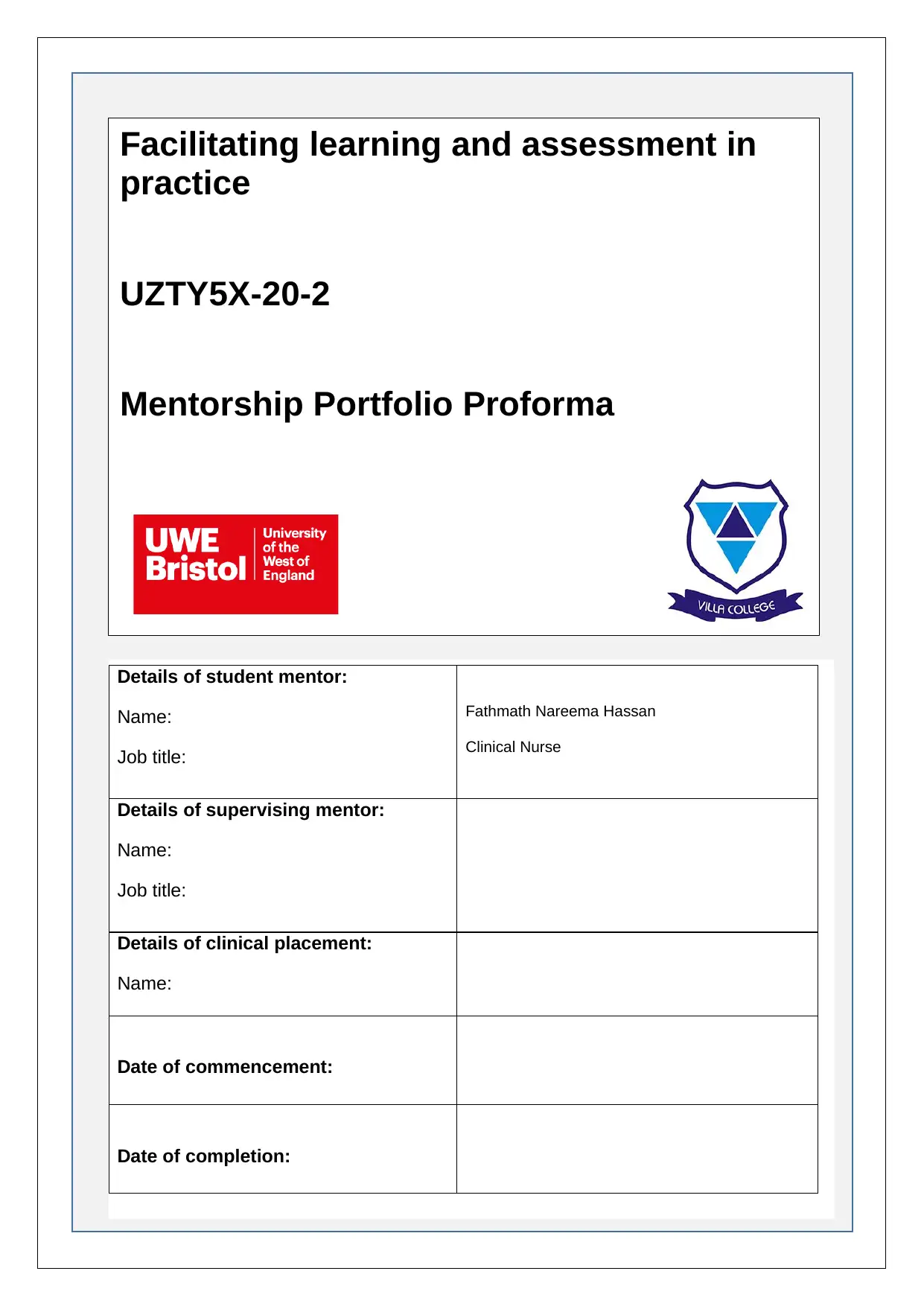
Facilitating learning and assessment in
practice
UZTY5X-20-2
Mentorship Portfolio Proforma
Details of student mentor:
Name:
Job title:
Fathmath Nareema Hassan
Clinical Nurse
Details of supervising mentor:
Name:
Job title:
Details of clinical placement:
Name:
Date of commencement:
Date of completion:
practice
UZTY5X-20-2
Mentorship Portfolio Proforma
Details of student mentor:
Name:
Job title:
Fathmath Nareema Hassan
Clinical Nurse
Details of supervising mentor:
Name:
Job title:
Details of clinical placement:
Name:
Date of commencement:
Date of completion:
Secure Best Marks with AI Grader
Need help grading? Try our AI Grader for instant feedback on your assignments.
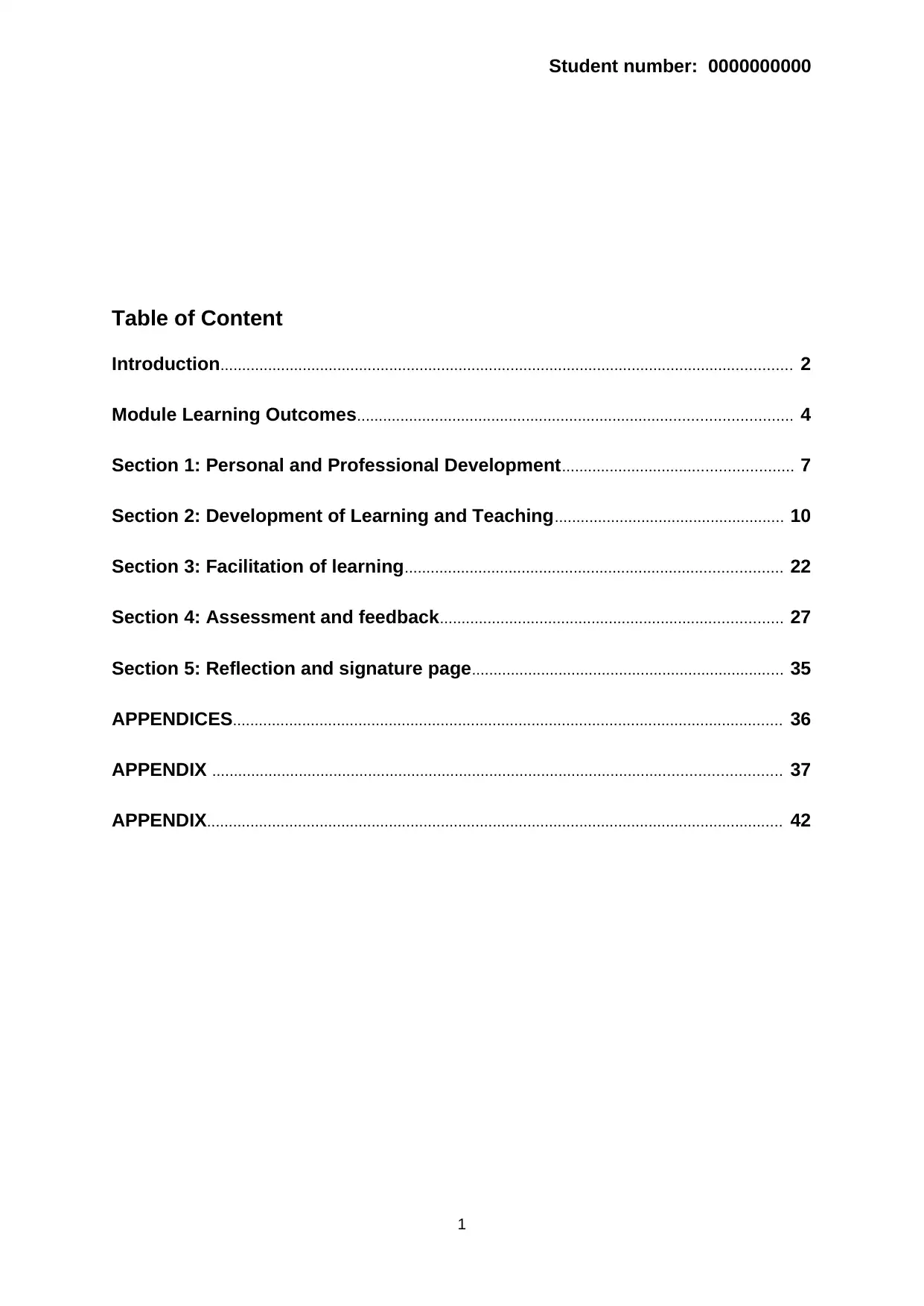
Student number: 0000000000
Table of Content
Introduction.................................................................................................................................... 2
Module Learning Outcomes.................................................................................................... 4
Section 1: Personal and Professional Development..................................................... 7
Section 2: Development of Learning and Teaching..................................................... 10
Section 3: Facilitation of learning....................................................................................... 22
Section 4: Assessment and feedback............................................................................... 27
Section 5: Reflection and signature page........................................................................ 35
APPENDICES............................................................................................................................... 36
APPENDIX ................................................................................................................................... 37
APPENDIX..................................................................................................................................... 42
1
Table of Content
Introduction.................................................................................................................................... 2
Module Learning Outcomes.................................................................................................... 4
Section 1: Personal and Professional Development..................................................... 7
Section 2: Development of Learning and Teaching..................................................... 10
Section 3: Facilitation of learning....................................................................................... 22
Section 4: Assessment and feedback............................................................................... 27
Section 5: Reflection and signature page........................................................................ 35
APPENDICES............................................................................................................................... 36
APPENDIX ................................................................................................................................... 37
APPENDIX..................................................................................................................................... 42
1
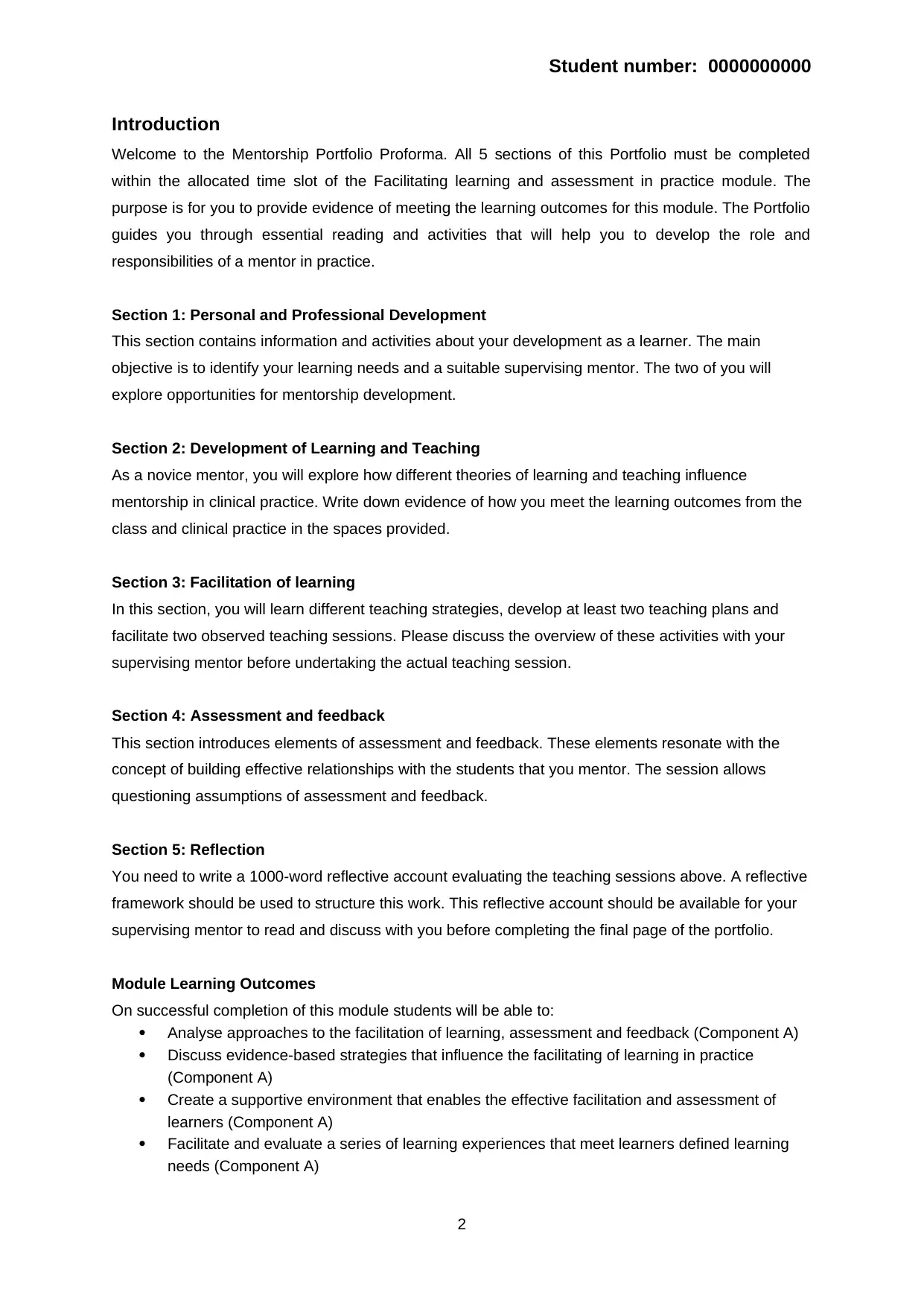
Student number: 0000000000
Introduction
Welcome to the Mentorship Portfolio Proforma. All 5 sections of this Portfolio must be completed
within the allocated time slot of the Facilitating learning and assessment in practice module. The
purpose is for you to provide evidence of meeting the learning outcomes for this module. The Portfolio
guides you through essential reading and activities that will help you to develop the role and
responsibilities of a mentor in practice.
Section 1: Personal and Professional Development
This section contains information and activities about your development as a learner. The main
objective is to identify your learning needs and a suitable supervising mentor. The two of you will
explore opportunities for mentorship development.
Section 2: Development of Learning and Teaching
As a novice mentor, you will explore how different theories of learning and teaching influence
mentorship in clinical practice. Write down evidence of how you meet the learning outcomes from the
class and clinical practice in the spaces provided.
Section 3: Facilitation of learning
In this section, you will learn different teaching strategies, develop at least two teaching plans and
facilitate two observed teaching sessions. Please discuss the overview of these activities with your
supervising mentor before undertaking the actual teaching session.
Section 4: Assessment and feedback
This section introduces elements of assessment and feedback. These elements resonate with the
concept of building effective relationships with the students that you mentor. The session allows
questioning assumptions of assessment and feedback.
Section 5: Reflection
You need to write a 1000-word reflective account evaluating the teaching sessions above. A reflective
framework should be used to structure this work. This reflective account should be available for your
supervising mentor to read and discuss with you before completing the final page of the portfolio.
Module Learning Outcomes
On successful completion of this module students will be able to:
Analyse approaches to the facilitation of learning, assessment and feedback (Component A)
Discuss evidence-based strategies that influence the facilitating of learning in practice
(Component A)
Create a supportive environment that enables the effective facilitation and assessment of
learners (Component A)
Facilitate and evaluate a series of learning experiences that meet learners defined learning
needs (Component A)
2
Introduction
Welcome to the Mentorship Portfolio Proforma. All 5 sections of this Portfolio must be completed
within the allocated time slot of the Facilitating learning and assessment in practice module. The
purpose is for you to provide evidence of meeting the learning outcomes for this module. The Portfolio
guides you through essential reading and activities that will help you to develop the role and
responsibilities of a mentor in practice.
Section 1: Personal and Professional Development
This section contains information and activities about your development as a learner. The main
objective is to identify your learning needs and a suitable supervising mentor. The two of you will
explore opportunities for mentorship development.
Section 2: Development of Learning and Teaching
As a novice mentor, you will explore how different theories of learning and teaching influence
mentorship in clinical practice. Write down evidence of how you meet the learning outcomes from the
class and clinical practice in the spaces provided.
Section 3: Facilitation of learning
In this section, you will learn different teaching strategies, develop at least two teaching plans and
facilitate two observed teaching sessions. Please discuss the overview of these activities with your
supervising mentor before undertaking the actual teaching session.
Section 4: Assessment and feedback
This section introduces elements of assessment and feedback. These elements resonate with the
concept of building effective relationships with the students that you mentor. The session allows
questioning assumptions of assessment and feedback.
Section 5: Reflection
You need to write a 1000-word reflective account evaluating the teaching sessions above. A reflective
framework should be used to structure this work. This reflective account should be available for your
supervising mentor to read and discuss with you before completing the final page of the portfolio.
Module Learning Outcomes
On successful completion of this module students will be able to:
Analyse approaches to the facilitation of learning, assessment and feedback (Component A)
Discuss evidence-based strategies that influence the facilitating of learning in practice
(Component A)
Create a supportive environment that enables the effective facilitation and assessment of
learners (Component A)
Facilitate and evaluate a series of learning experiences that meet learners defined learning
needs (Component A)
2
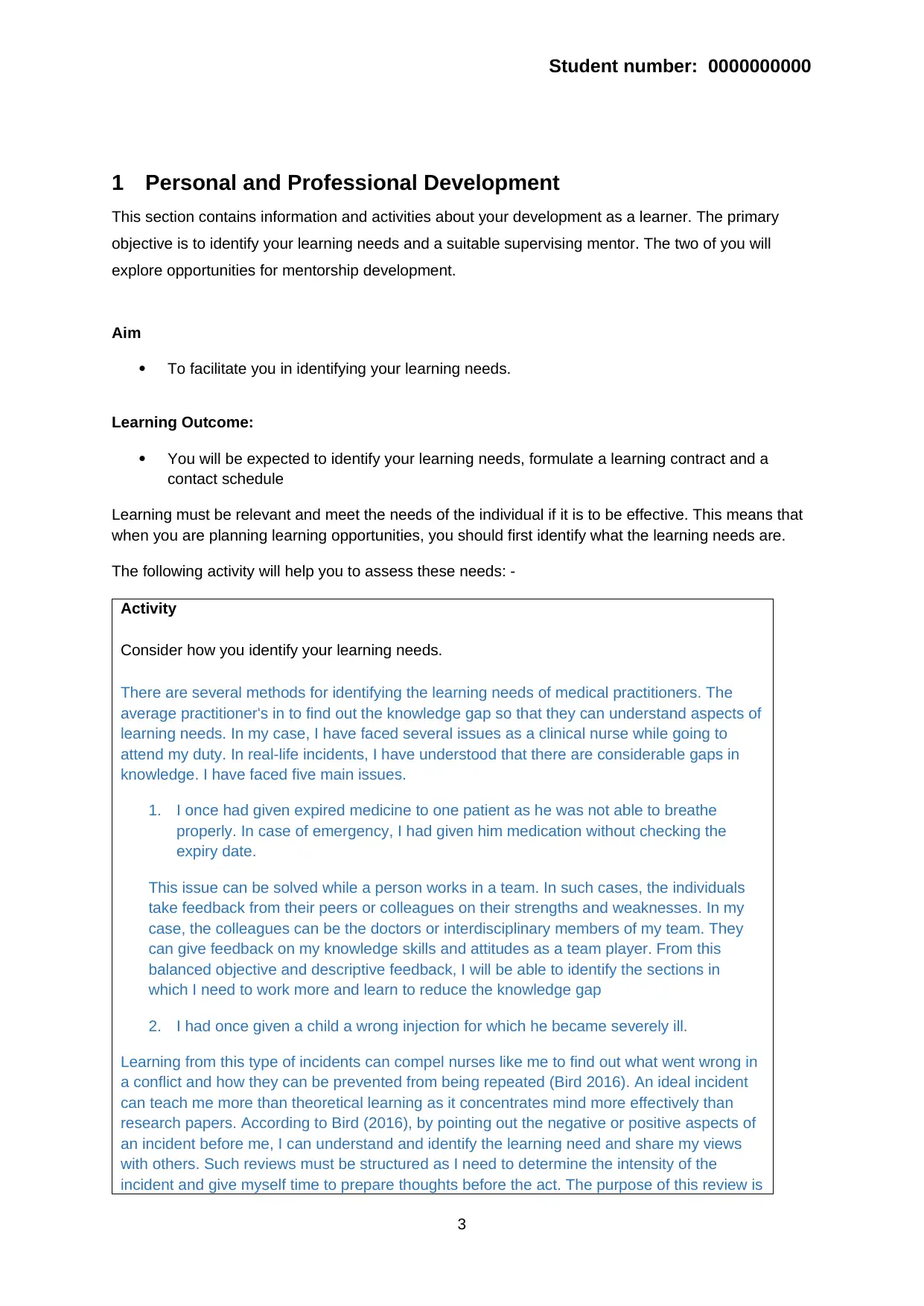
Student number: 0000000000
1 Personal and Professional Development
This section contains information and activities about your development as a learner. The primary
objective is to identify your learning needs and a suitable supervising mentor. The two of you will
explore opportunities for mentorship development.
Aim
To facilitate you in identifying your learning needs.
Learning Outcome:
You will be expected to identify your learning needs, formulate a learning contract and a
contact schedule
Learning must be relevant and meet the needs of the individual if it is to be effective. This means that
when you are planning learning opportunities, you should first identify what the learning needs are.
The following activity will help you to assess these needs: -
Activity
Consider how you identify your learning needs.
There are several methods for identifying the learning needs of medical practitioners. The
average practitioner's in to find out the knowledge gap so that they can understand aspects of
learning needs. In my case, I have faced several issues as a clinical nurse while going to
attend my duty. In real-life incidents, I have understood that there are considerable gaps in
knowledge. I have faced five main issues.
1. I once had given expired medicine to one patient as he was not able to breathe
properly. In case of emergency, I had given him medication without checking the
expiry date.
This issue can be solved while a person works in a team. In such cases, the individuals
take feedback from their peers or colleagues on their strengths and weaknesses. In my
case, the colleagues can be the doctors or interdisciplinary members of my team. They
can give feedback on my knowledge skills and attitudes as a team player. From this
balanced objective and descriptive feedback, I will be able to identify the sections in
which I need to work more and learn to reduce the knowledge gap
2. I had once given a child a wrong injection for which he became severely ill.
Learning from this type of incidents can compel nurses like me to find out what went wrong in
a conflict and how they can be prevented from being repeated (Bird 2016). An ideal incident
can teach me more than theoretical learning as it concentrates mind more effectively than
research papers. According to Bird (2016), by pointing out the negative or positive aspects of
an incident before me, I can understand and identify the learning need and share my views
with others. Such reviews must be structured as I need to determine the intensity of the
incident and give myself time to prepare thoughts before the act. The purpose of this review is
3
1 Personal and Professional Development
This section contains information and activities about your development as a learner. The primary
objective is to identify your learning needs and a suitable supervising mentor. The two of you will
explore opportunities for mentorship development.
Aim
To facilitate you in identifying your learning needs.
Learning Outcome:
You will be expected to identify your learning needs, formulate a learning contract and a
contact schedule
Learning must be relevant and meet the needs of the individual if it is to be effective. This means that
when you are planning learning opportunities, you should first identify what the learning needs are.
The following activity will help you to assess these needs: -
Activity
Consider how you identify your learning needs.
There are several methods for identifying the learning needs of medical practitioners. The
average practitioner's in to find out the knowledge gap so that they can understand aspects of
learning needs. In my case, I have faced several issues as a clinical nurse while going to
attend my duty. In real-life incidents, I have understood that there are considerable gaps in
knowledge. I have faced five main issues.
1. I once had given expired medicine to one patient as he was not able to breathe
properly. In case of emergency, I had given him medication without checking the
expiry date.
This issue can be solved while a person works in a team. In such cases, the individuals
take feedback from their peers or colleagues on their strengths and weaknesses. In my
case, the colleagues can be the doctors or interdisciplinary members of my team. They
can give feedback on my knowledge skills and attitudes as a team player. From this
balanced objective and descriptive feedback, I will be able to identify the sections in
which I need to work more and learn to reduce the knowledge gap
2. I had once given a child a wrong injection for which he became severely ill.
Learning from this type of incidents can compel nurses like me to find out what went wrong in
a conflict and how they can be prevented from being repeated (Bird 2016). An ideal incident
can teach me more than theoretical learning as it concentrates mind more effectively than
research papers. According to Bird (2016), by pointing out the negative or positive aspects of
an incident before me, I can understand and identify the learning need and share my views
with others. Such reviews must be structured as I need to determine the intensity of the
incident and give myself time to prepare thoughts before the act. The purpose of this review is
3
Secure Best Marks with AI Grader
Need help grading? Try our AI Grader for instant feedback on your assignments.
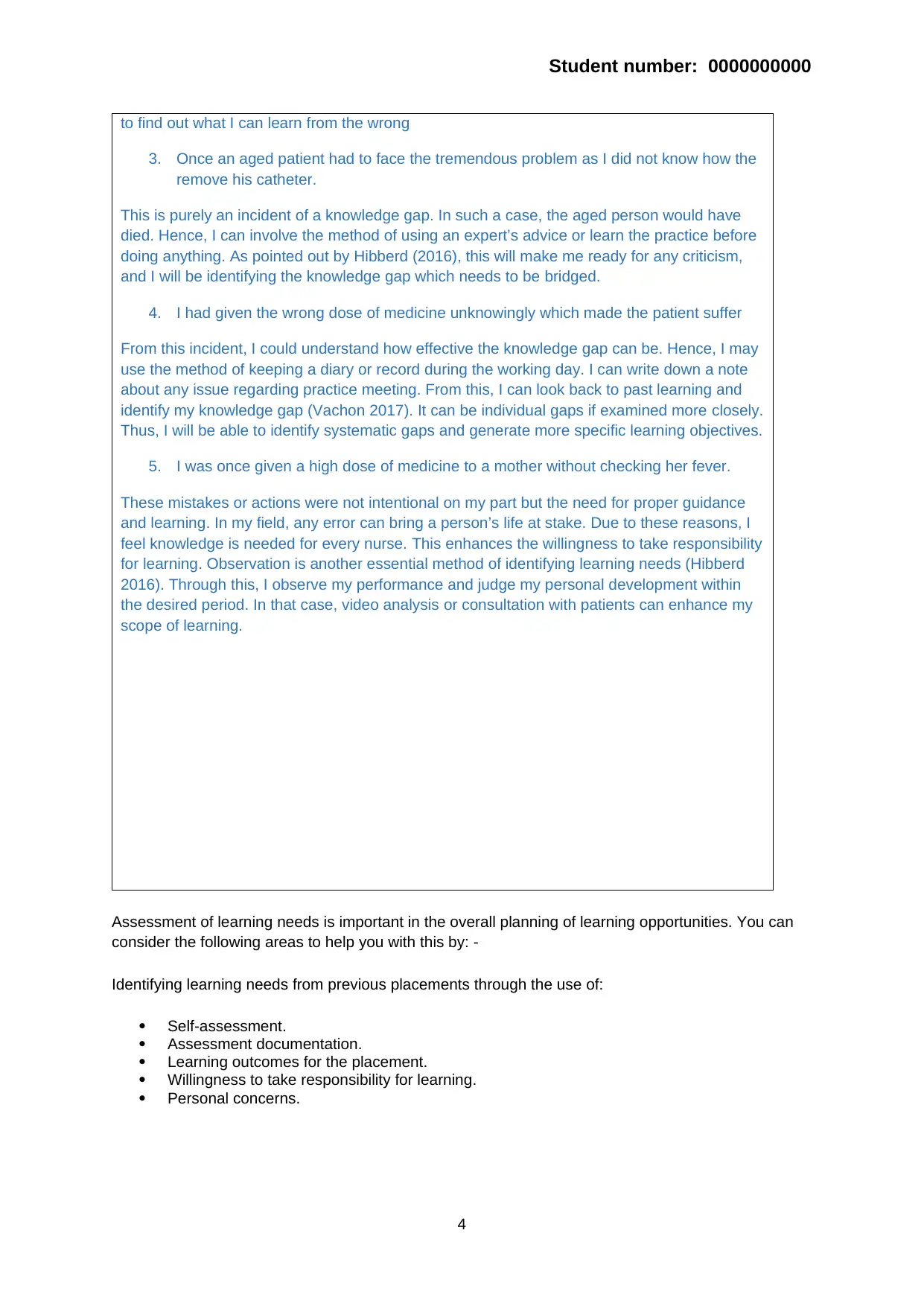
Student number: 0000000000
to find out what I can learn from the wrong
3. Once an aged patient had to face the tremendous problem as I did not know how the
remove his catheter.
This is purely an incident of a knowledge gap. In such a case, the aged person would have
died. Hence, I can involve the method of using an expert’s advice or learn the practice before
doing anything. As pointed out by Hibberd (2016), this will make me ready for any criticism,
and I will be identifying the knowledge gap which needs to be bridged.
4. I had given the wrong dose of medicine unknowingly which made the patient suffer
From this incident, I could understand how effective the knowledge gap can be. Hence, I may
use the method of keeping a diary or record during the working day. I can write down a note
about any issue regarding practice meeting. From this, I can look back to past learning and
identify my knowledge gap (Vachon 2017). It can be individual gaps if examined more closely.
Thus, I will be able to identify systematic gaps and generate more specific learning objectives.
5. I was once given a high dose of medicine to a mother without checking her fever.
These mistakes or actions were not intentional on my part but the need for proper guidance
and learning. In my field, any error can bring a person’s life at stake. Due to these reasons, I
feel knowledge is needed for every nurse. This enhances the willingness to take responsibility
for learning. Observation is another essential method of identifying learning needs (Hibberd
2016). Through this, I observe my performance and judge my personal development within
the desired period. In that case, video analysis or consultation with patients can enhance my
scope of learning.
Assessment of learning needs is important in the overall planning of learning opportunities. You can
consider the following areas to help you with this by: -
Identifying learning needs from previous placements through the use of:
Self-assessment.
Assessment documentation.
Learning outcomes for the placement.
Willingness to take responsibility for learning.
Personal concerns.
4
to find out what I can learn from the wrong
3. Once an aged patient had to face the tremendous problem as I did not know how the
remove his catheter.
This is purely an incident of a knowledge gap. In such a case, the aged person would have
died. Hence, I can involve the method of using an expert’s advice or learn the practice before
doing anything. As pointed out by Hibberd (2016), this will make me ready for any criticism,
and I will be identifying the knowledge gap which needs to be bridged.
4. I had given the wrong dose of medicine unknowingly which made the patient suffer
From this incident, I could understand how effective the knowledge gap can be. Hence, I may
use the method of keeping a diary or record during the working day. I can write down a note
about any issue regarding practice meeting. From this, I can look back to past learning and
identify my knowledge gap (Vachon 2017). It can be individual gaps if examined more closely.
Thus, I will be able to identify systematic gaps and generate more specific learning objectives.
5. I was once given a high dose of medicine to a mother without checking her fever.
These mistakes or actions were not intentional on my part but the need for proper guidance
and learning. In my field, any error can bring a person’s life at stake. Due to these reasons, I
feel knowledge is needed for every nurse. This enhances the willingness to take responsibility
for learning. Observation is another essential method of identifying learning needs (Hibberd
2016). Through this, I observe my performance and judge my personal development within
the desired period. In that case, video analysis or consultation with patients can enhance my
scope of learning.
Assessment of learning needs is important in the overall planning of learning opportunities. You can
consider the following areas to help you with this by: -
Identifying learning needs from previous placements through the use of:
Self-assessment.
Assessment documentation.
Learning outcomes for the placement.
Willingness to take responsibility for learning.
Personal concerns.
4
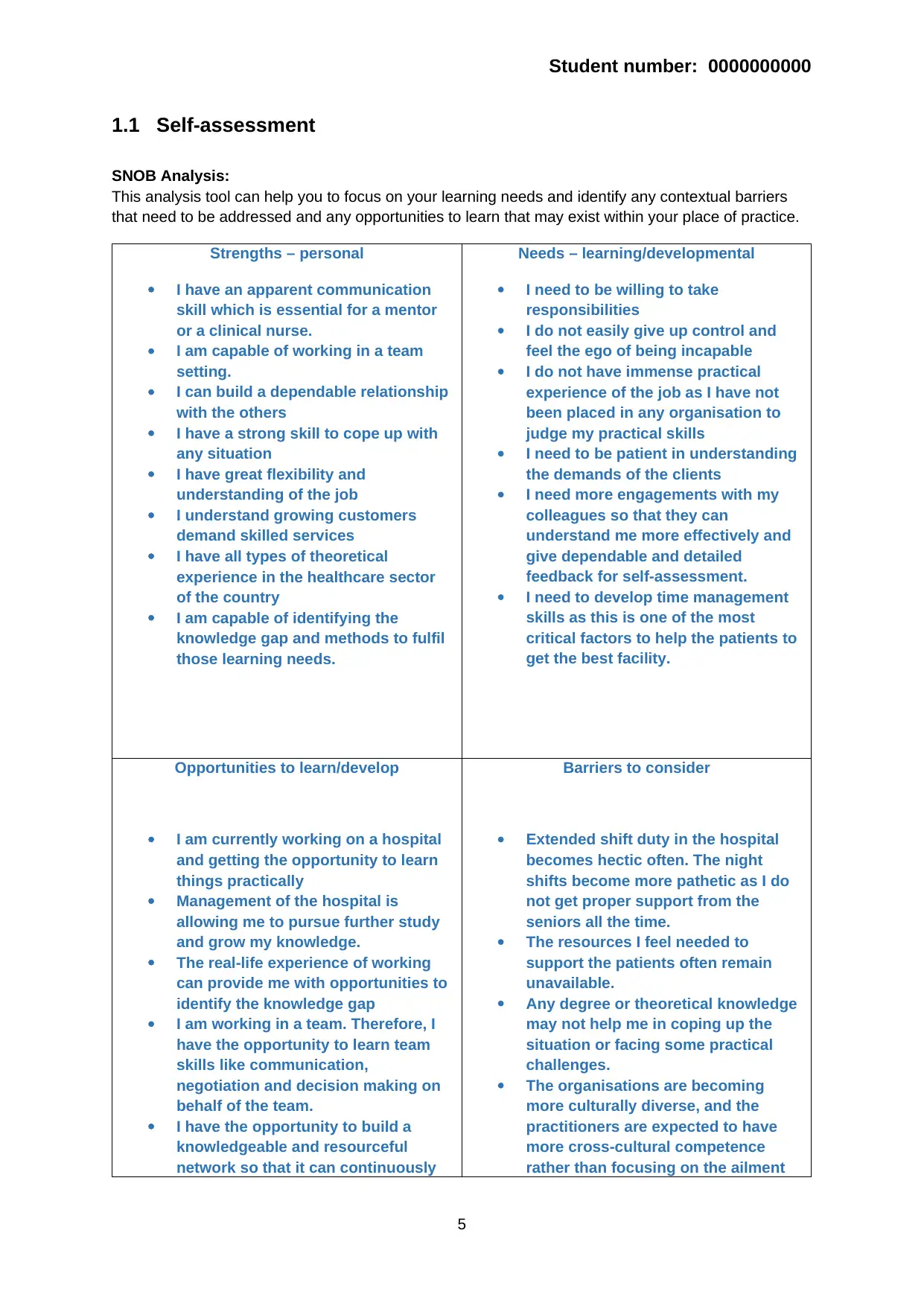
Student number: 0000000000
1.1 Self-assessment
SNOB Analysis:
This analysis tool can help you to focus on your learning needs and identify any contextual barriers
that need to be addressed and any opportunities to learn that may exist within your place of practice.
Strengths – personal
I have an apparent communication
skill which is essential for a mentor
or a clinical nurse.
I am capable of working in a team
setting.
I can build a dependable relationship
with the others
I have a strong skill to cope up with
any situation
I have great flexibility and
understanding of the job
I understand growing customers
demand skilled services
I have all types of theoretical
experience in the healthcare sector
of the country
I am capable of identifying the
knowledge gap and methods to fulfil
those learning needs.
Needs – learning/developmental
I need to be willing to take
responsibilities
I do not easily give up control and
feel the ego of being incapable
I do not have immense practical
experience of the job as I have not
been placed in any organisation to
judge my practical skills
I need to be patient in understanding
the demands of the clients
I need more engagements with my
colleagues so that they can
understand me more effectively and
give dependable and detailed
feedback for self-assessment.
I need to develop time management
skills as this is one of the most
critical factors to help the patients to
get the best facility.
Opportunities to learn/develop
I am currently working on a hospital
and getting the opportunity to learn
things practically
Management of the hospital is
allowing me to pursue further study
and grow my knowledge.
The real-life experience of working
can provide me with opportunities to
identify the knowledge gap
I am working in a team. Therefore, I
have the opportunity to learn team
skills like communication,
negotiation and decision making on
behalf of the team.
I have the opportunity to build a
knowledgeable and resourceful
network so that it can continuously
Barriers to consider
Extended shift duty in the hospital
becomes hectic often. The night
shifts become more pathetic as I do
not get proper support from the
seniors all the time.
The resources I feel needed to
support the patients often remain
unavailable.
Any degree or theoretical knowledge
may not help me in coping up the
situation or facing some practical
challenges.
The organisations are becoming
more culturally diverse, and the
practitioners are expected to have
more cross-cultural competence
rather than focusing on the ailment
5
1.1 Self-assessment
SNOB Analysis:
This analysis tool can help you to focus on your learning needs and identify any contextual barriers
that need to be addressed and any opportunities to learn that may exist within your place of practice.
Strengths – personal
I have an apparent communication
skill which is essential for a mentor
or a clinical nurse.
I am capable of working in a team
setting.
I can build a dependable relationship
with the others
I have a strong skill to cope up with
any situation
I have great flexibility and
understanding of the job
I understand growing customers
demand skilled services
I have all types of theoretical
experience in the healthcare sector
of the country
I am capable of identifying the
knowledge gap and methods to fulfil
those learning needs.
Needs – learning/developmental
I need to be willing to take
responsibilities
I do not easily give up control and
feel the ego of being incapable
I do not have immense practical
experience of the job as I have not
been placed in any organisation to
judge my practical skills
I need to be patient in understanding
the demands of the clients
I need more engagements with my
colleagues so that they can
understand me more effectively and
give dependable and detailed
feedback for self-assessment.
I need to develop time management
skills as this is one of the most
critical factors to help the patients to
get the best facility.
Opportunities to learn/develop
I am currently working on a hospital
and getting the opportunity to learn
things practically
Management of the hospital is
allowing me to pursue further study
and grow my knowledge.
The real-life experience of working
can provide me with opportunities to
identify the knowledge gap
I am working in a team. Therefore, I
have the opportunity to learn team
skills like communication,
negotiation and decision making on
behalf of the team.
I have the opportunity to build a
knowledgeable and resourceful
network so that it can continuously
Barriers to consider
Extended shift duty in the hospital
becomes hectic often. The night
shifts become more pathetic as I do
not get proper support from the
seniors all the time.
The resources I feel needed to
support the patients often remain
unavailable.
Any degree or theoretical knowledge
may not help me in coping up the
situation or facing some practical
challenges.
The organisations are becoming
more culturally diverse, and the
practitioners are expected to have
more cross-cultural competence
rather than focusing on the ailment
5
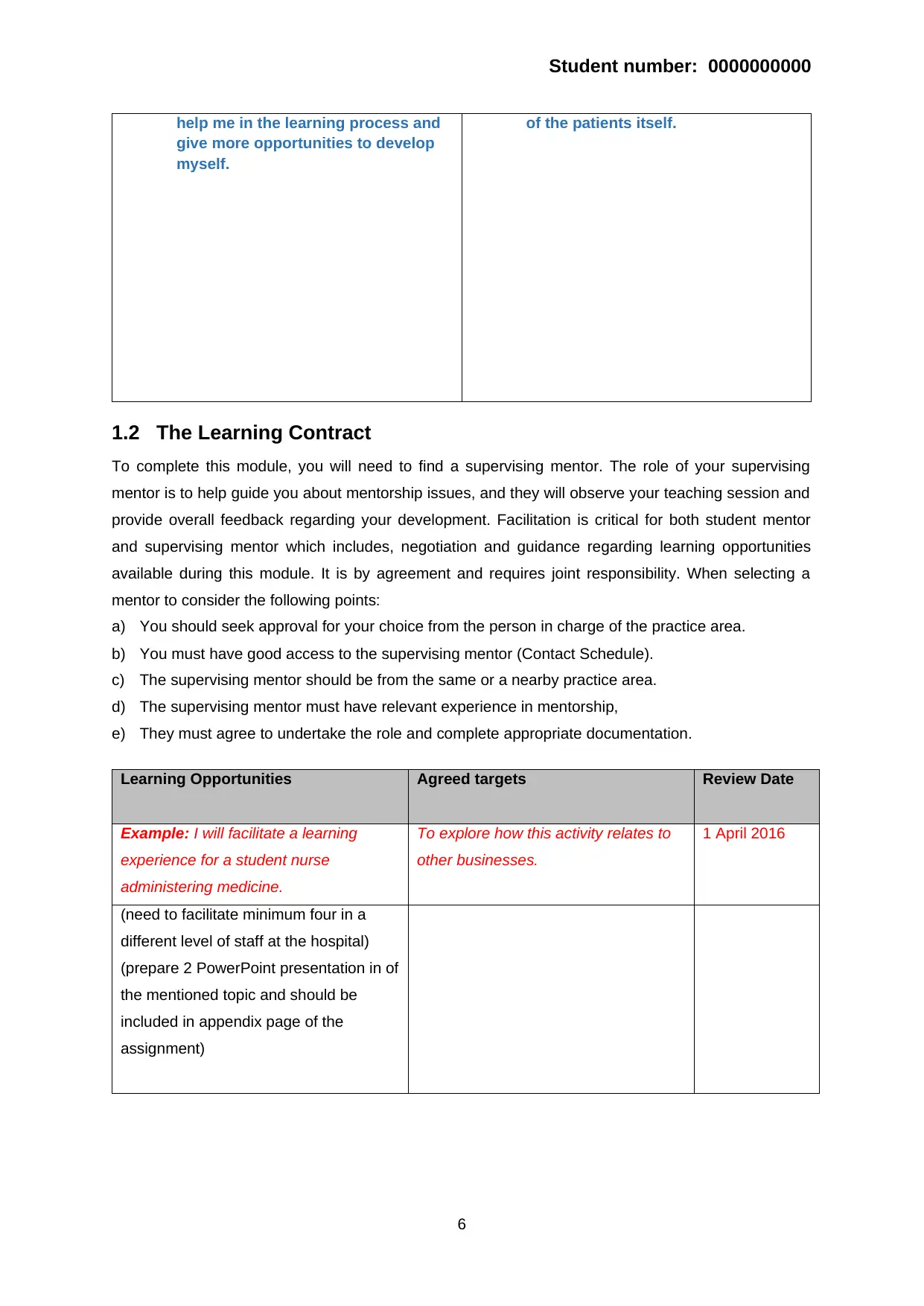
Student number: 0000000000
help me in the learning process and
give more opportunities to develop
myself.
of the patients itself.
1.2 The Learning Contract
To complete this module, you will need to find a supervising mentor. The role of your supervising
mentor is to help guide you about mentorship issues, and they will observe your teaching session and
provide overall feedback regarding your development. Facilitation is critical for both student mentor
and supervising mentor which includes, negotiation and guidance regarding learning opportunities
available during this module. It is by agreement and requires joint responsibility. When selecting a
mentor to consider the following points:
a) You should seek approval for your choice from the person in charge of the practice area.
b) You must have good access to the supervising mentor (Contact Schedule).
c) The supervising mentor should be from the same or a nearby practice area.
d) The supervising mentor must have relevant experience in mentorship,
e) They must agree to undertake the role and complete appropriate documentation.
Learning Opportunities Agreed targets Review Date
Example: I will facilitate a learning
experience for a student nurse
administering medicine.
To explore how this activity relates to
other businesses.
1 April 2016
(need to facilitate minimum four in a
different level of staff at the hospital)
(prepare 2 PowerPoint presentation in of
the mentioned topic and should be
included in appendix page of the
assignment)
6
help me in the learning process and
give more opportunities to develop
myself.
of the patients itself.
1.2 The Learning Contract
To complete this module, you will need to find a supervising mentor. The role of your supervising
mentor is to help guide you about mentorship issues, and they will observe your teaching session and
provide overall feedback regarding your development. Facilitation is critical for both student mentor
and supervising mentor which includes, negotiation and guidance regarding learning opportunities
available during this module. It is by agreement and requires joint responsibility. When selecting a
mentor to consider the following points:
a) You should seek approval for your choice from the person in charge of the practice area.
b) You must have good access to the supervising mentor (Contact Schedule).
c) The supervising mentor should be from the same or a nearby practice area.
d) The supervising mentor must have relevant experience in mentorship,
e) They must agree to undertake the role and complete appropriate documentation.
Learning Opportunities Agreed targets Review Date
Example: I will facilitate a learning
experience for a student nurse
administering medicine.
To explore how this activity relates to
other businesses.
1 April 2016
(need to facilitate minimum four in a
different level of staff at the hospital)
(prepare 2 PowerPoint presentation in of
the mentioned topic and should be
included in appendix page of the
assignment)
6
Paraphrase This Document
Need a fresh take? Get an instant paraphrase of this document with our AI Paraphraser
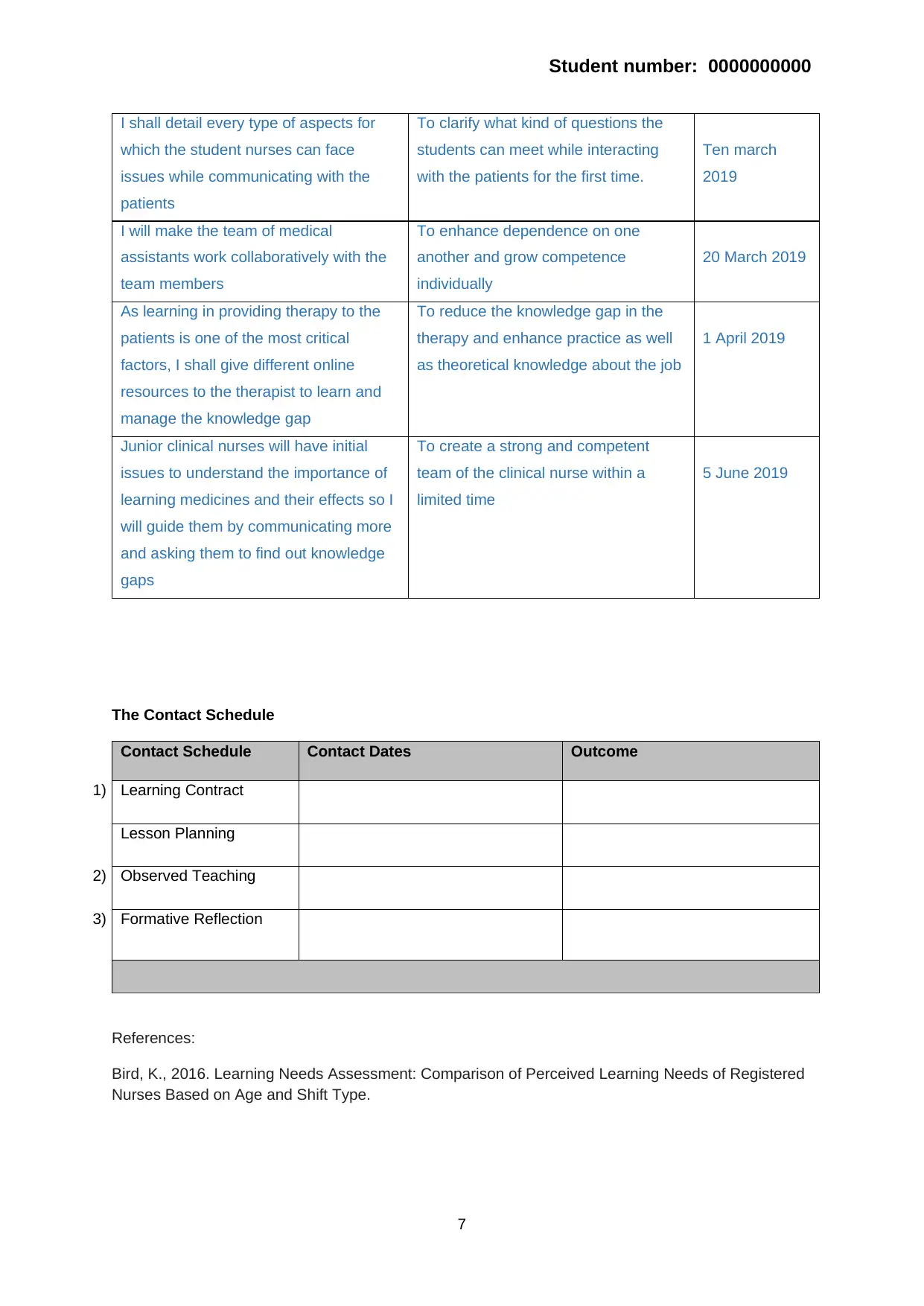
Student number: 0000000000
I shall detail every type of aspects for
which the student nurses can face
issues while communicating with the
patients
To clarify what kind of questions the
students can meet while interacting
with the patients for the first time.
Ten march
2019
I will make the team of medical
assistants work collaboratively with the
team members
To enhance dependence on one
another and grow competence
individually
20 March 2019
As learning in providing therapy to the
patients is one of the most critical
factors, I shall give different online
resources to the therapist to learn and
manage the knowledge gap
To reduce the knowledge gap in the
therapy and enhance practice as well
as theoretical knowledge about the job
1 April 2019
Junior clinical nurses will have initial
issues to understand the importance of
learning medicines and their effects so I
will guide them by communicating more
and asking them to find out knowledge
gaps
To create a strong and competent
team of the clinical nurse within a
limited time
5 June 2019
The Contact Schedule
Contact Schedule Contact Dates Outcome
1) Learning Contract
Lesson Planning
2) Observed Teaching
3) Formative Reflection
References:
Bird, K., 2016. Learning Needs Assessment: Comparison of Perceived Learning Needs of Registered
Nurses Based on Age and Shift Type.
7
I shall detail every type of aspects for
which the student nurses can face
issues while communicating with the
patients
To clarify what kind of questions the
students can meet while interacting
with the patients for the first time.
Ten march
2019
I will make the team of medical
assistants work collaboratively with the
team members
To enhance dependence on one
another and grow competence
individually
20 March 2019
As learning in providing therapy to the
patients is one of the most critical
factors, I shall give different online
resources to the therapist to learn and
manage the knowledge gap
To reduce the knowledge gap in the
therapy and enhance practice as well
as theoretical knowledge about the job
1 April 2019
Junior clinical nurses will have initial
issues to understand the importance of
learning medicines and their effects so I
will guide them by communicating more
and asking them to find out knowledge
gaps
To create a strong and competent
team of the clinical nurse within a
limited time
5 June 2019
The Contact Schedule
Contact Schedule Contact Dates Outcome
1) Learning Contract
Lesson Planning
2) Observed Teaching
3) Formative Reflection
References:
Bird, K., 2016. Learning Needs Assessment: Comparison of Perceived Learning Needs of Registered
Nurses Based on Age and Shift Type.
7
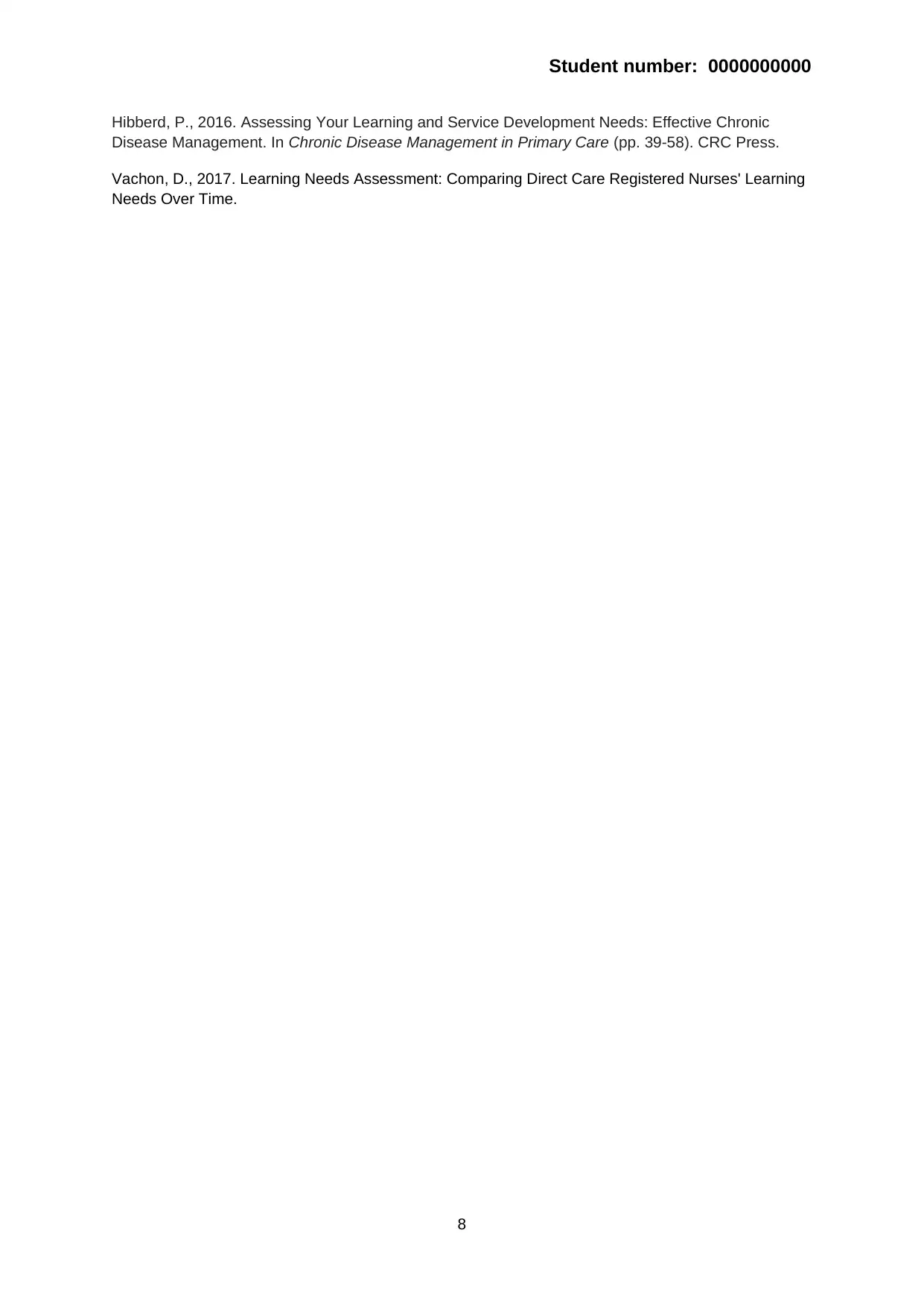
Student number: 0000000000
Hibberd, P., 2016. Assessing Your Learning and Service Development Needs: Effective Chronic
Disease Management. In Chronic Disease Management in Primary Care (pp. 39-58). CRC Press.
Vachon, D., 2017. Learning Needs Assessment: Comparing Direct Care Registered Nurses' Learning
Needs Over Time.
8
Hibberd, P., 2016. Assessing Your Learning and Service Development Needs: Effective Chronic
Disease Management. In Chronic Disease Management in Primary Care (pp. 39-58). CRC Press.
Vachon, D., 2017. Learning Needs Assessment: Comparing Direct Care Registered Nurses' Learning
Needs Over Time.
8
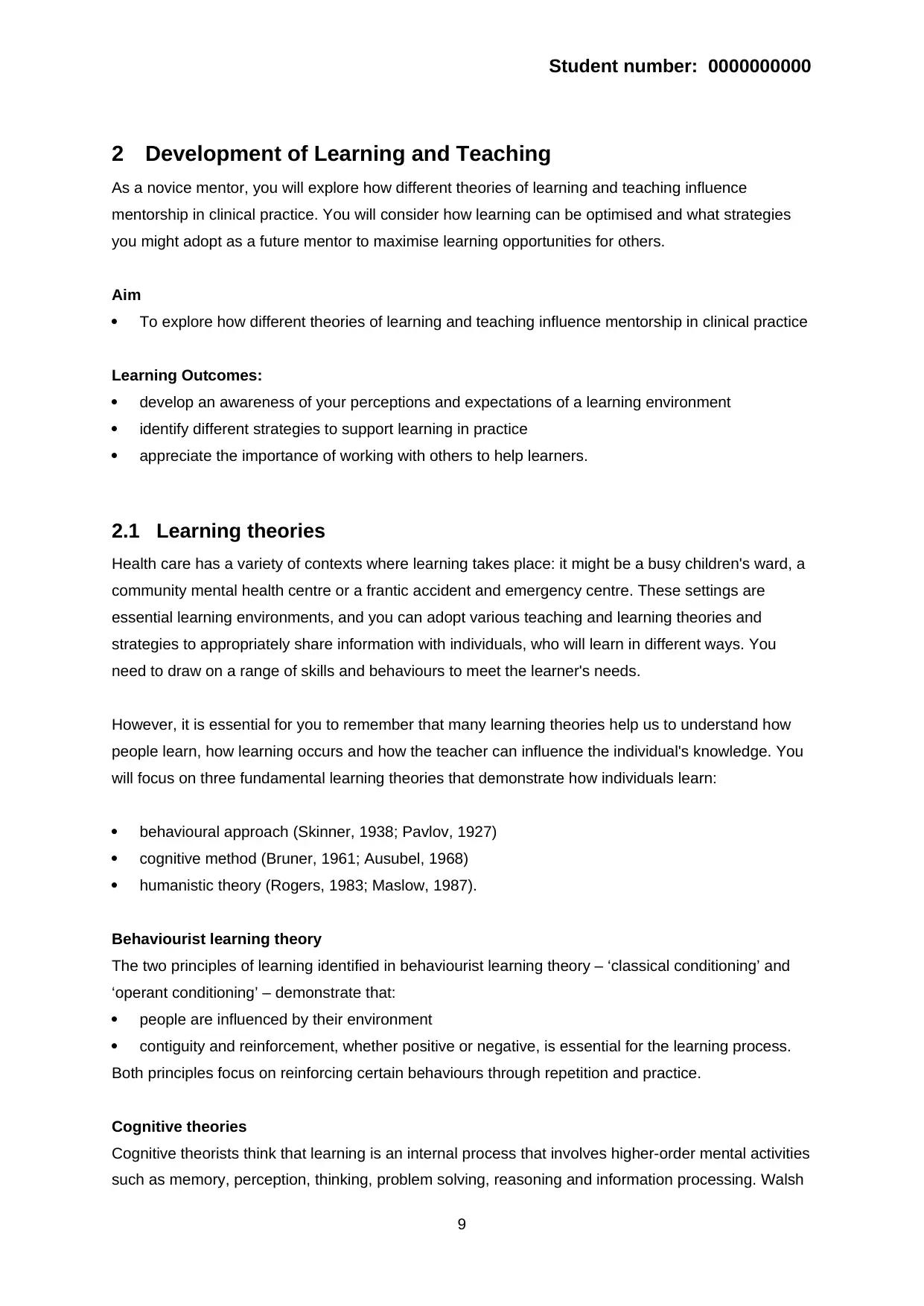
Student number: 0000000000
2 Development of Learning and Teaching
As a novice mentor, you will explore how different theories of learning and teaching influence
mentorship in clinical practice. You will consider how learning can be optimised and what strategies
you might adopt as a future mentor to maximise learning opportunities for others.
Aim
To explore how different theories of learning and teaching influence mentorship in clinical practice
Learning Outcomes:
develop an awareness of your perceptions and expectations of a learning environment
identify different strategies to support learning in practice
appreciate the importance of working with others to help learners.
2.1 Learning theories
Health care has a variety of contexts where learning takes place: it might be a busy children's ward, a
community mental health centre or a frantic accident and emergency centre. These settings are
essential learning environments, and you can adopt various teaching and learning theories and
strategies to appropriately share information with individuals, who will learn in different ways. You
need to draw on a range of skills and behaviours to meet the learner's needs.
However, it is essential for you to remember that many learning theories help us to understand how
people learn, how learning occurs and how the teacher can influence the individual's knowledge. You
will focus on three fundamental learning theories that demonstrate how individuals learn:
behavioural approach (Skinner, 1938; Pavlov, 1927)
cognitive method (Bruner, 1961; Ausubel, 1968)
humanistic theory (Rogers, 1983; Maslow, 1987).
Behaviourist learning theory
The two principles of learning identified in behaviourist learning theory – ‘classical conditioning’ and
‘operant conditioning’ – demonstrate that:
people are influenced by their environment
contiguity and reinforcement, whether positive or negative, is essential for the learning process.
Both principles focus on reinforcing certain behaviours through repetition and practice.
Cognitive theories
Cognitive theorists think that learning is an internal process that involves higher-order mental activities
such as memory, perception, thinking, problem solving, reasoning and information processing. Walsh
9
2 Development of Learning and Teaching
As a novice mentor, you will explore how different theories of learning and teaching influence
mentorship in clinical practice. You will consider how learning can be optimised and what strategies
you might adopt as a future mentor to maximise learning opportunities for others.
Aim
To explore how different theories of learning and teaching influence mentorship in clinical practice
Learning Outcomes:
develop an awareness of your perceptions and expectations of a learning environment
identify different strategies to support learning in practice
appreciate the importance of working with others to help learners.
2.1 Learning theories
Health care has a variety of contexts where learning takes place: it might be a busy children's ward, a
community mental health centre or a frantic accident and emergency centre. These settings are
essential learning environments, and you can adopt various teaching and learning theories and
strategies to appropriately share information with individuals, who will learn in different ways. You
need to draw on a range of skills and behaviours to meet the learner's needs.
However, it is essential for you to remember that many learning theories help us to understand how
people learn, how learning occurs and how the teacher can influence the individual's knowledge. You
will focus on three fundamental learning theories that demonstrate how individuals learn:
behavioural approach (Skinner, 1938; Pavlov, 1927)
cognitive method (Bruner, 1961; Ausubel, 1968)
humanistic theory (Rogers, 1983; Maslow, 1987).
Behaviourist learning theory
The two principles of learning identified in behaviourist learning theory – ‘classical conditioning’ and
‘operant conditioning’ – demonstrate that:
people are influenced by their environment
contiguity and reinforcement, whether positive or negative, is essential for the learning process.
Both principles focus on reinforcing certain behaviours through repetition and practice.
Cognitive theories
Cognitive theorists think that learning is an internal process that involves higher-order mental activities
such as memory, perception, thinking, problem solving, reasoning and information processing. Walsh
9
Secure Best Marks with AI Grader
Need help grading? Try our AI Grader for instant feedback on your assignments.
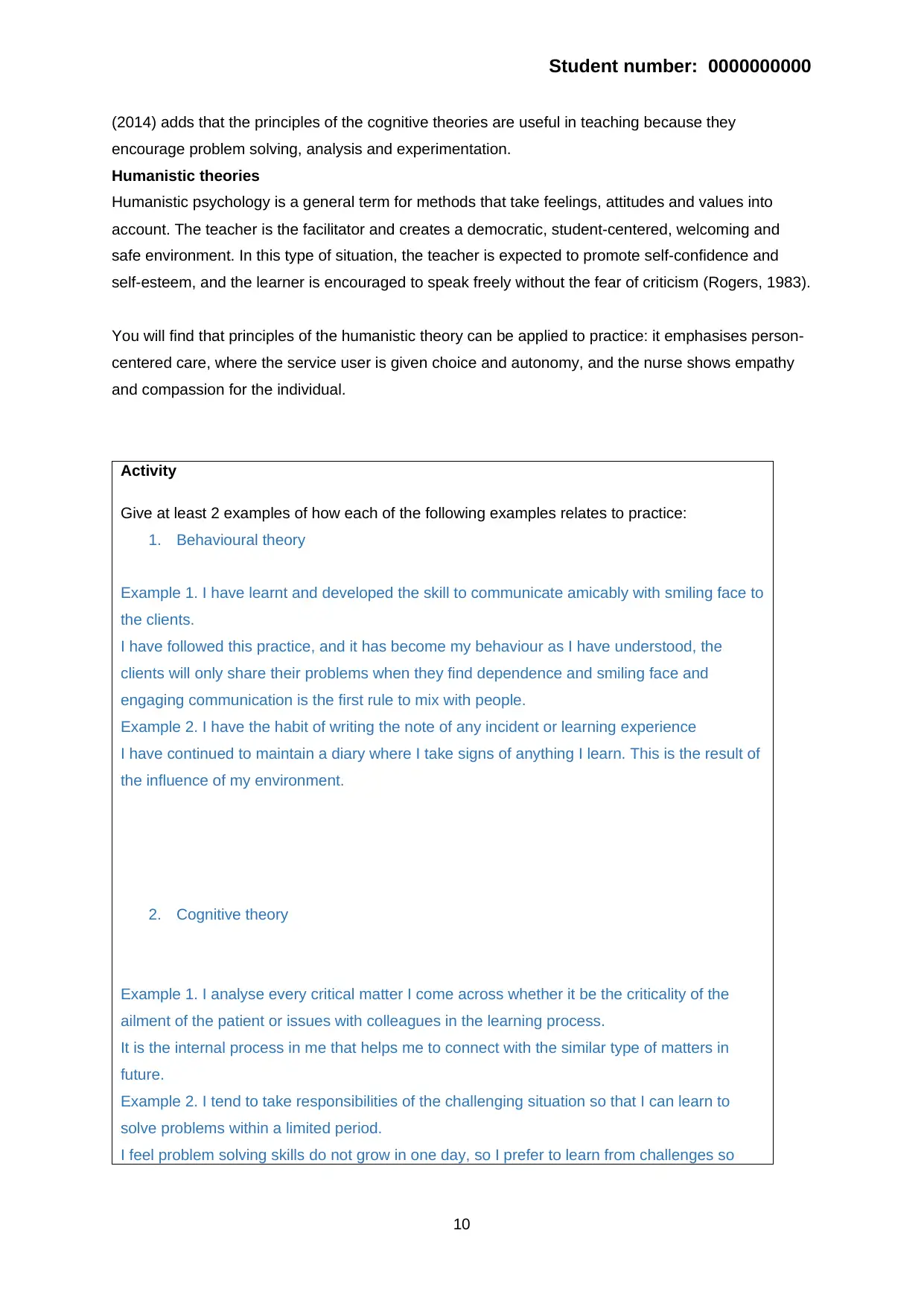
Student number: 0000000000
(2014) adds that the principles of the cognitive theories are useful in teaching because they
encourage problem solving, analysis and experimentation.
Humanistic theories
Humanistic psychology is a general term for methods that take feelings, attitudes and values into
account. The teacher is the facilitator and creates a democratic, student-centered, welcoming and
safe environment. In this type of situation, the teacher is expected to promote self-confidence and
self-esteem, and the learner is encouraged to speak freely without the fear of criticism (Rogers, 1983).
You will find that principles of the humanistic theory can be applied to practice: it emphasises person-
centered care, where the service user is given choice and autonomy, and the nurse shows empathy
and compassion for the individual.
Activity
Give at least 2 examples of how each of the following examples relates to practice:
1. Behavioural theory
Example 1. I have learnt and developed the skill to communicate amicably with smiling face to
the clients.
I have followed this practice, and it has become my behaviour as I have understood, the
clients will only share their problems when they find dependence and smiling face and
engaging communication is the first rule to mix with people.
Example 2. I have the habit of writing the note of any incident or learning experience
I have continued to maintain a diary where I take signs of anything I learn. This is the result of
the influence of my environment.
2. Cognitive theory
Example 1. I analyse every critical matter I come across whether it be the criticality of the
ailment of the patient or issues with colleagues in the learning process.
It is the internal process in me that helps me to connect with the similar type of matters in
future.
Example 2. I tend to take responsibilities of the challenging situation so that I can learn to
solve problems within a limited period.
I feel problem solving skills do not grow in one day, so I prefer to learn from challenges so
10
(2014) adds that the principles of the cognitive theories are useful in teaching because they
encourage problem solving, analysis and experimentation.
Humanistic theories
Humanistic psychology is a general term for methods that take feelings, attitudes and values into
account. The teacher is the facilitator and creates a democratic, student-centered, welcoming and
safe environment. In this type of situation, the teacher is expected to promote self-confidence and
self-esteem, and the learner is encouraged to speak freely without the fear of criticism (Rogers, 1983).
You will find that principles of the humanistic theory can be applied to practice: it emphasises person-
centered care, where the service user is given choice and autonomy, and the nurse shows empathy
and compassion for the individual.
Activity
Give at least 2 examples of how each of the following examples relates to practice:
1. Behavioural theory
Example 1. I have learnt and developed the skill to communicate amicably with smiling face to
the clients.
I have followed this practice, and it has become my behaviour as I have understood, the
clients will only share their problems when they find dependence and smiling face and
engaging communication is the first rule to mix with people.
Example 2. I have the habit of writing the note of any incident or learning experience
I have continued to maintain a diary where I take signs of anything I learn. This is the result of
the influence of my environment.
2. Cognitive theory
Example 1. I analyse every critical matter I come across whether it be the criticality of the
ailment of the patient or issues with colleagues in the learning process.
It is the internal process in me that helps me to connect with the similar type of matters in
future.
Example 2. I tend to take responsibilities of the challenging situation so that I can learn to
solve problems within a limited period.
I feel problem solving skills do not grow in one day, so I prefer to learn from challenges so
10
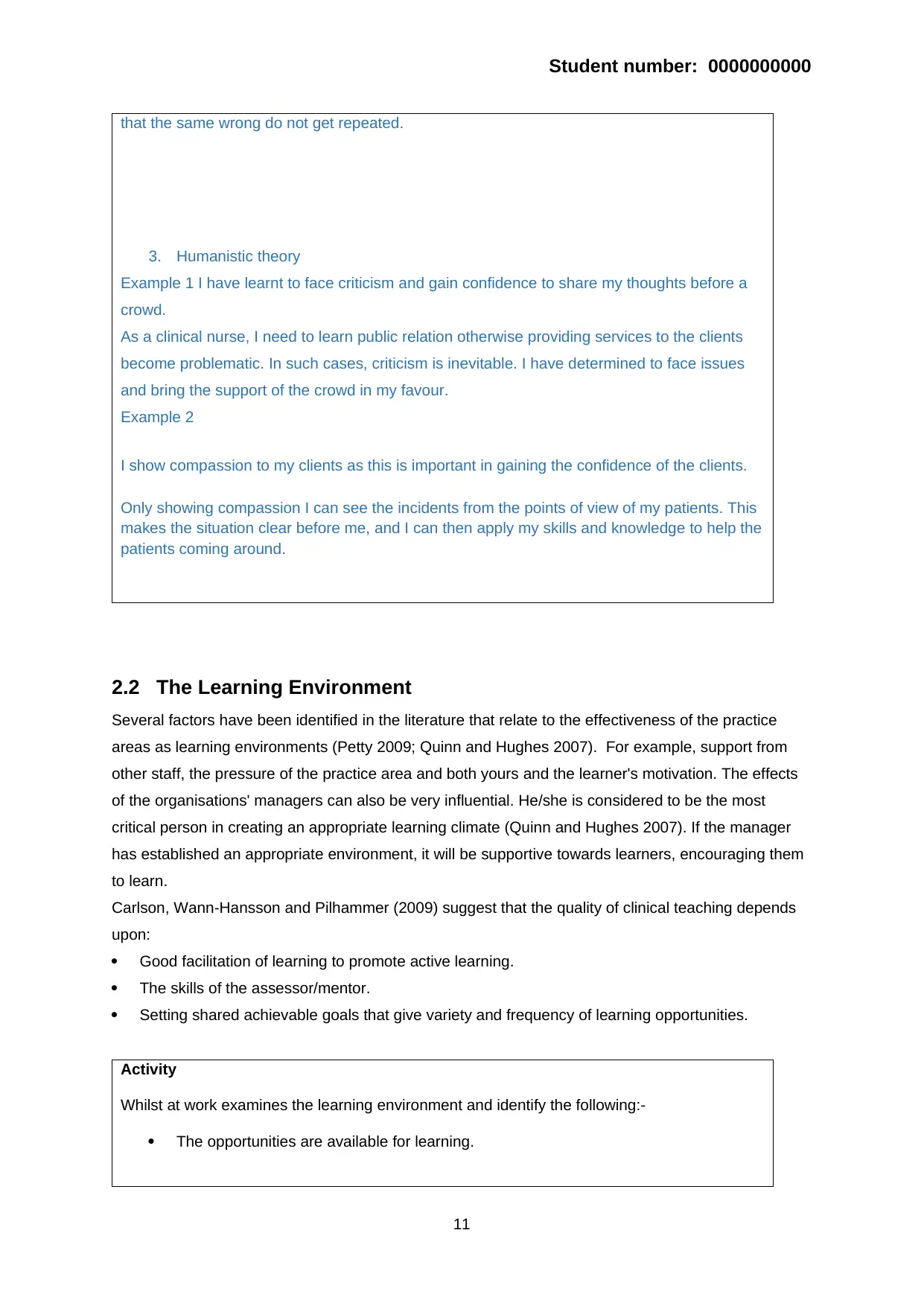
Student number: 0000000000
that the same wrong do not get repeated.
3. Humanistic theory
Example 1 I have learnt to face criticism and gain confidence to share my thoughts before a
crowd.
As a clinical nurse, I need to learn public relation otherwise providing services to the clients
become problematic. In such cases, criticism is inevitable. I have determined to face issues
and bring the support of the crowd in my favour.
Example 2
I show compassion to my clients as this is important in gaining the confidence of the clients.
Only showing compassion I can see the incidents from the points of view of my patients. This
makes the situation clear before me, and I can then apply my skills and knowledge to help the
patients coming around.
2.2 The Learning Environment
Several factors have been identified in the literature that relate to the effectiveness of the practice
areas as learning environments (Petty 2009; Quinn and Hughes 2007). For example, support from
other staff, the pressure of the practice area and both yours and the learner's motivation. The effects
of the organisations' managers can also be very influential. He/she is considered to be the most
critical person in creating an appropriate learning climate (Quinn and Hughes 2007). If the manager
has established an appropriate environment, it will be supportive towards learners, encouraging them
to learn.
Carlson, Wann-Hansson and Pilhammer (2009) suggest that the quality of clinical teaching depends
upon:
Good facilitation of learning to promote active learning.
The skills of the assessor/mentor.
Setting shared achievable goals that give variety and frequency of learning opportunities.
Activity
Whilst at work examines the learning environment and identify the following:-
The opportunities are available for learning.
11
that the same wrong do not get repeated.
3. Humanistic theory
Example 1 I have learnt to face criticism and gain confidence to share my thoughts before a
crowd.
As a clinical nurse, I need to learn public relation otherwise providing services to the clients
become problematic. In such cases, criticism is inevitable. I have determined to face issues
and bring the support of the crowd in my favour.
Example 2
I show compassion to my clients as this is important in gaining the confidence of the clients.
Only showing compassion I can see the incidents from the points of view of my patients. This
makes the situation clear before me, and I can then apply my skills and knowledge to help the
patients coming around.
2.2 The Learning Environment
Several factors have been identified in the literature that relate to the effectiveness of the practice
areas as learning environments (Petty 2009; Quinn and Hughes 2007). For example, support from
other staff, the pressure of the practice area and both yours and the learner's motivation. The effects
of the organisations' managers can also be very influential. He/she is considered to be the most
critical person in creating an appropriate learning climate (Quinn and Hughes 2007). If the manager
has established an appropriate environment, it will be supportive towards learners, encouraging them
to learn.
Carlson, Wann-Hansson and Pilhammer (2009) suggest that the quality of clinical teaching depends
upon:
Good facilitation of learning to promote active learning.
The skills of the assessor/mentor.
Setting shared achievable goals that give variety and frequency of learning opportunities.
Activity
Whilst at work examines the learning environment and identify the following:-
The opportunities are available for learning.
11
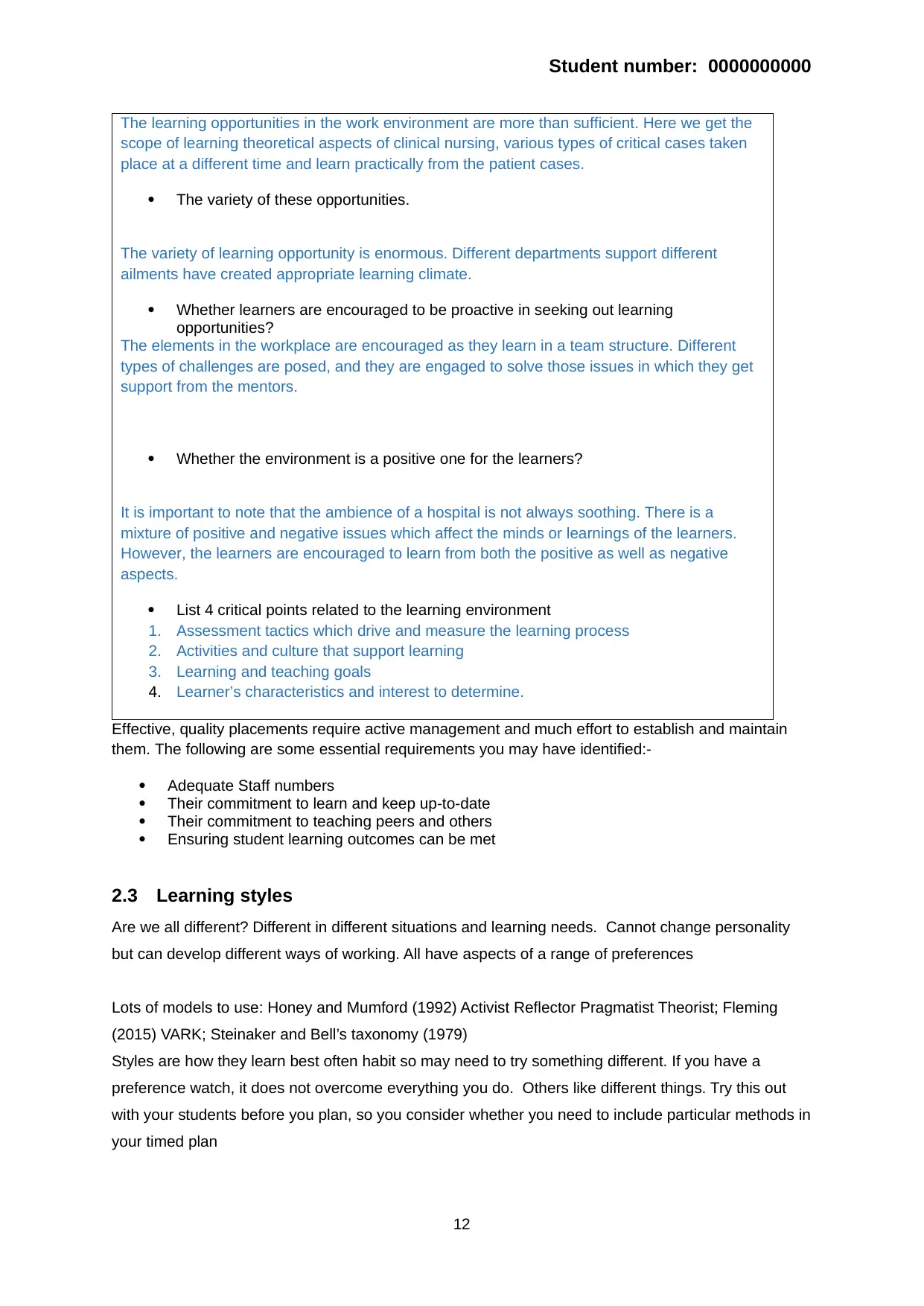
Student number: 0000000000
The learning opportunities in the work environment are more than sufficient. Here we get the
scope of learning theoretical aspects of clinical nursing, various types of critical cases taken
place at a different time and learn practically from the patient cases.
The variety of these opportunities.
The variety of learning opportunity is enormous. Different departments support different
ailments have created appropriate learning climate.
Whether learners are encouraged to be proactive in seeking out learning
opportunities?
The elements in the workplace are encouraged as they learn in a team structure. Different
types of challenges are posed, and they are engaged to solve those issues in which they get
support from the mentors.
Whether the environment is a positive one for the learners?
It is important to note that the ambience of a hospital is not always soothing. There is a
mixture of positive and negative issues which affect the minds or learnings of the learners.
However, the learners are encouraged to learn from both the positive as well as negative
aspects.
List 4 critical points related to the learning environment
1. Assessment tactics which drive and measure the learning process
2. Activities and culture that support learning
3. Learning and teaching goals
4. Learner’s characteristics and interest to determine.
Effective, quality placements require active management and much effort to establish and maintain
them. The following are some essential requirements you may have identified:-
Adequate Staff numbers
Their commitment to learn and keep up-to-date
Their commitment to teaching peers and others
Ensuring student learning outcomes can be met
2.3 Learning styles
Are we all different? Different in different situations and learning needs. Cannot change personality
but can develop different ways of working. All have aspects of a range of preferences
Lots of models to use: Honey and Mumford (1992) Activist Reflector Pragmatist Theorist; Fleming
(2015) VARK; Steinaker and Bell’s taxonomy (1979)
Styles are how they learn best often habit so may need to try something different. If you have a
preference watch, it does not overcome everything you do. Others like different things. Try this out
with your students before you plan, so you consider whether you need to include particular methods in
your timed plan
12
The learning opportunities in the work environment are more than sufficient. Here we get the
scope of learning theoretical aspects of clinical nursing, various types of critical cases taken
place at a different time and learn practically from the patient cases.
The variety of these opportunities.
The variety of learning opportunity is enormous. Different departments support different
ailments have created appropriate learning climate.
Whether learners are encouraged to be proactive in seeking out learning
opportunities?
The elements in the workplace are encouraged as they learn in a team structure. Different
types of challenges are posed, and they are engaged to solve those issues in which they get
support from the mentors.
Whether the environment is a positive one for the learners?
It is important to note that the ambience of a hospital is not always soothing. There is a
mixture of positive and negative issues which affect the minds or learnings of the learners.
However, the learners are encouraged to learn from both the positive as well as negative
aspects.
List 4 critical points related to the learning environment
1. Assessment tactics which drive and measure the learning process
2. Activities and culture that support learning
3. Learning and teaching goals
4. Learner’s characteristics and interest to determine.
Effective, quality placements require active management and much effort to establish and maintain
them. The following are some essential requirements you may have identified:-
Adequate Staff numbers
Their commitment to learn and keep up-to-date
Their commitment to teaching peers and others
Ensuring student learning outcomes can be met
2.3 Learning styles
Are we all different? Different in different situations and learning needs. Cannot change personality
but can develop different ways of working. All have aspects of a range of preferences
Lots of models to use: Honey and Mumford (1992) Activist Reflector Pragmatist Theorist; Fleming
(2015) VARK; Steinaker and Bell’s taxonomy (1979)
Styles are how they learn best often habit so may need to try something different. If you have a
preference watch, it does not overcome everything you do. Others like different things. Try this out
with your students before you plan, so you consider whether you need to include particular methods in
your timed plan
12
Paraphrase This Document
Need a fresh take? Get an instant paraphrase of this document with our AI Paraphraser
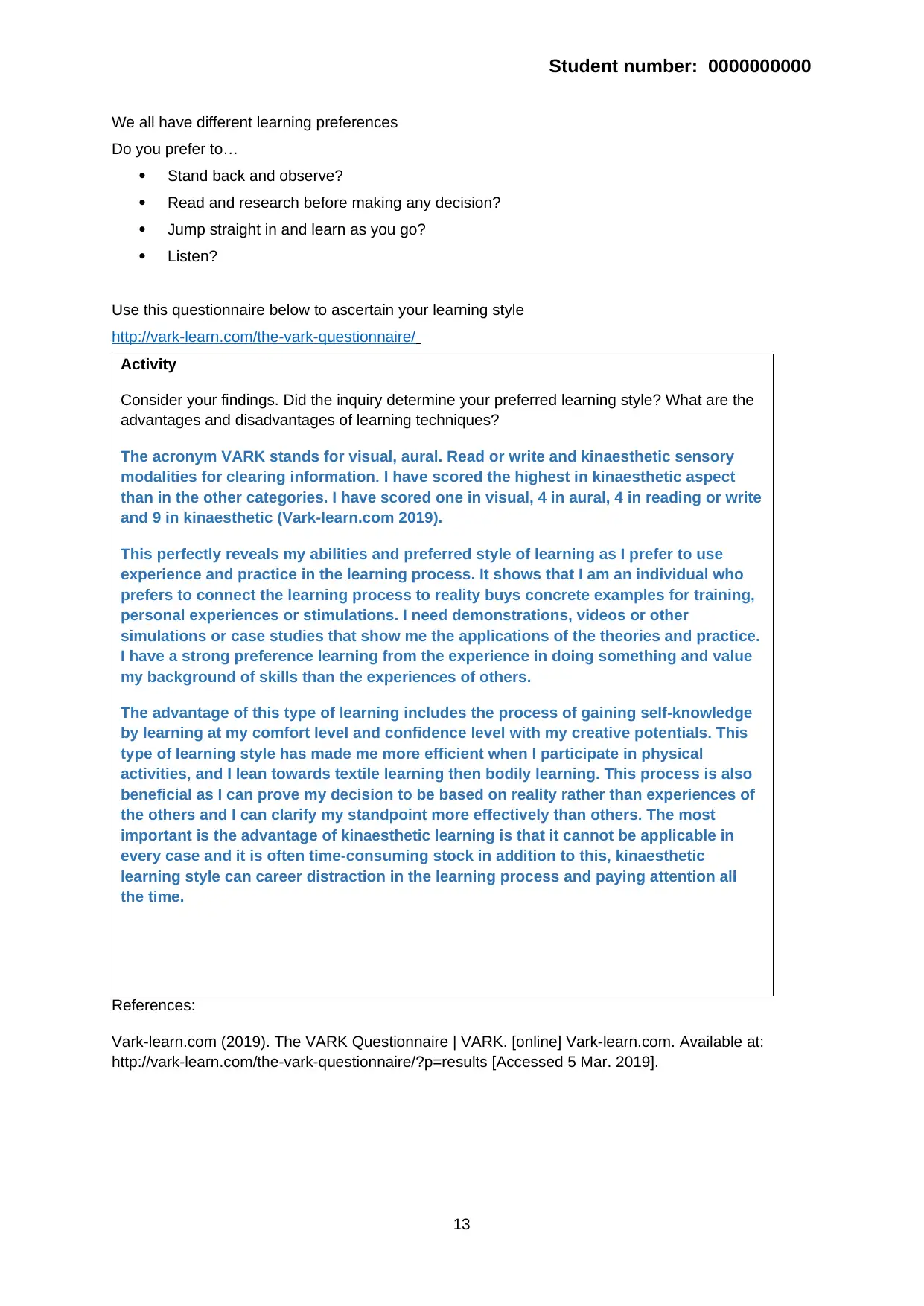
Student number: 0000000000
We all have different learning preferences
Do you prefer to…
Stand back and observe?
Read and research before making any decision?
Jump straight in and learn as you go?
Listen?
Use this questionnaire below to ascertain your learning style
http://vark-learn.com/the-vark-questionnaire/
Activity
Consider your findings. Did the inquiry determine your preferred learning style? What are the
advantages and disadvantages of learning techniques?
The acronym VARK stands for visual, aural. Read or write and kinaesthetic sensory
modalities for clearing information. I have scored the highest in kinaesthetic aspect
than in the other categories. I have scored one in visual, 4 in aural, 4 in reading or write
and 9 in kinaesthetic (Vark-learn.com 2019).
This perfectly reveals my abilities and preferred style of learning as I prefer to use
experience and practice in the learning process. It shows that I am an individual who
prefers to connect the learning process to reality buys concrete examples for training,
personal experiences or stimulations. I need demonstrations, videos or other
simulations or case studies that show me the applications of the theories and practice.
I have a strong preference learning from the experience in doing something and value
my background of skills than the experiences of others.
The advantage of this type of learning includes the process of gaining self-knowledge
by learning at my comfort level and confidence level with my creative potentials. This
type of learning style has made me more efficient when I participate in physical
activities, and I lean towards textile learning then bodily learning. This process is also
beneficial as I can prove my decision to be based on reality rather than experiences of
the others and I can clarify my standpoint more effectively than others. The most
important is the advantage of kinaesthetic learning is that it cannot be applicable in
every case and it is often time-consuming stock in addition to this, kinaesthetic
learning style can career distraction in the learning process and paying attention all
the time.
References:
Vark-learn.com (2019). The VARK Questionnaire | VARK. [online] Vark-learn.com. Available at:
http://vark-learn.com/the-vark-questionnaire/?p=results [Accessed 5 Mar. 2019].
13
We all have different learning preferences
Do you prefer to…
Stand back and observe?
Read and research before making any decision?
Jump straight in and learn as you go?
Listen?
Use this questionnaire below to ascertain your learning style
http://vark-learn.com/the-vark-questionnaire/
Activity
Consider your findings. Did the inquiry determine your preferred learning style? What are the
advantages and disadvantages of learning techniques?
The acronym VARK stands for visual, aural. Read or write and kinaesthetic sensory
modalities for clearing information. I have scored the highest in kinaesthetic aspect
than in the other categories. I have scored one in visual, 4 in aural, 4 in reading or write
and 9 in kinaesthetic (Vark-learn.com 2019).
This perfectly reveals my abilities and preferred style of learning as I prefer to use
experience and practice in the learning process. It shows that I am an individual who
prefers to connect the learning process to reality buys concrete examples for training,
personal experiences or stimulations. I need demonstrations, videos or other
simulations or case studies that show me the applications of the theories and practice.
I have a strong preference learning from the experience in doing something and value
my background of skills than the experiences of others.
The advantage of this type of learning includes the process of gaining self-knowledge
by learning at my comfort level and confidence level with my creative potentials. This
type of learning style has made me more efficient when I participate in physical
activities, and I lean towards textile learning then bodily learning. This process is also
beneficial as I can prove my decision to be based on reality rather than experiences of
the others and I can clarify my standpoint more effectively than others. The most
important is the advantage of kinaesthetic learning is that it cannot be applicable in
every case and it is often time-consuming stock in addition to this, kinaesthetic
learning style can career distraction in the learning process and paying attention all
the time.
References:
Vark-learn.com (2019). The VARK Questionnaire | VARK. [online] Vark-learn.com. Available at:
http://vark-learn.com/the-vark-questionnaire/?p=results [Accessed 5 Mar. 2019].
13
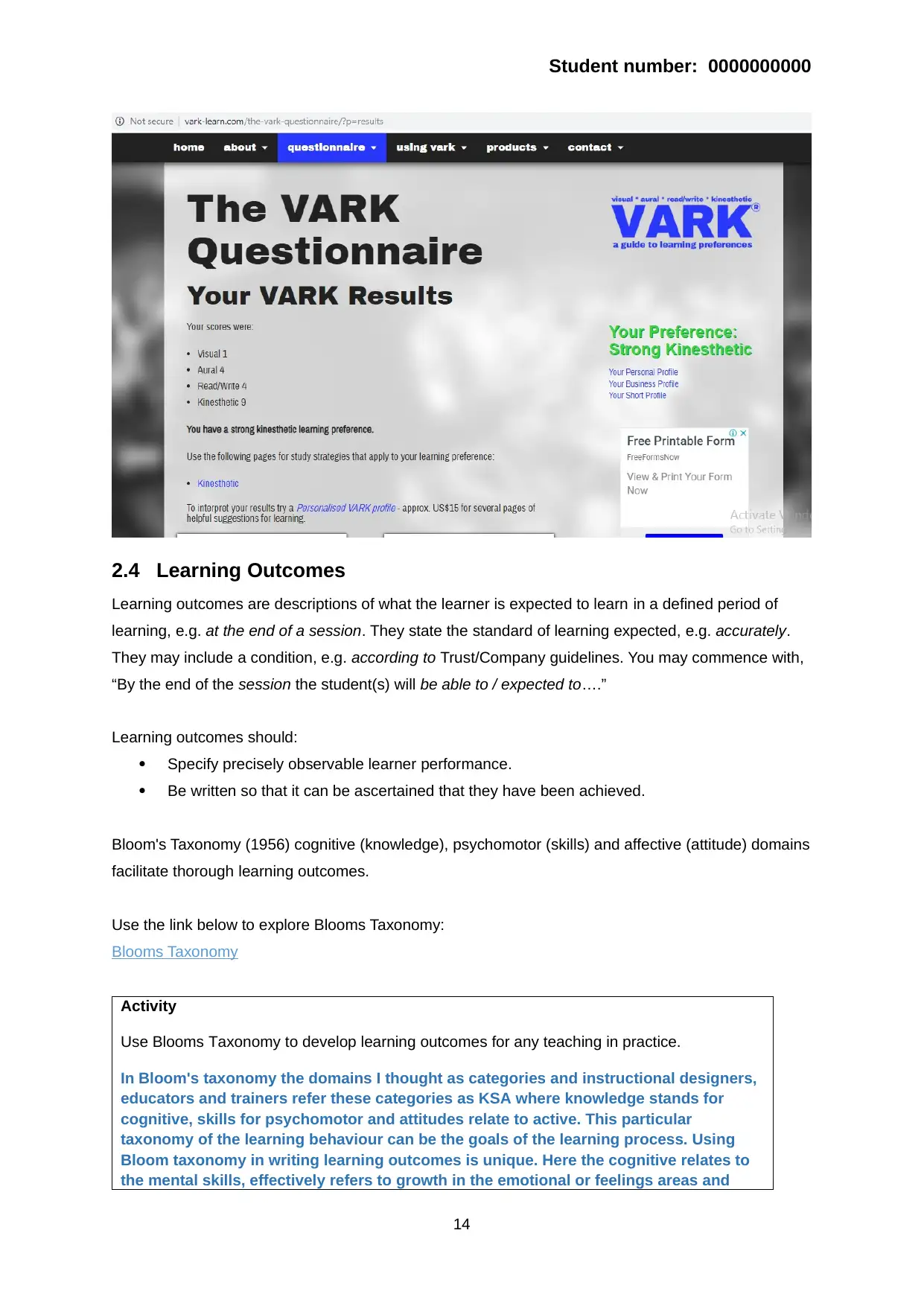
Student number: 0000000000
2.4 Learning Outcomes
Learning outcomes are descriptions of what the learner is expected to learn in a defined period of
learning, e.g. at the end of a session. They state the standard of learning expected, e.g. accurately.
They may include a condition, e.g. according to Trust/Company guidelines. You may commence with,
“By the end of the session the student(s) will be able to / expected to….”
Learning outcomes should:
Specify precisely observable learner performance.
Be written so that it can be ascertained that they have been achieved.
Bloom's Taxonomy (1956) cognitive (knowledge), psychomotor (skills) and affective (attitude) domains
facilitate thorough learning outcomes.
Use the link below to explore Blooms Taxonomy:
Blooms Taxonomy
Activity
Use Blooms Taxonomy to develop learning outcomes for any teaching in practice.
In Bloom's taxonomy the domains I thought as categories and instructional designers,
educators and trainers refer these categories as KSA where knowledge stands for
cognitive, skills for psychomotor and attitudes relate to active. This particular
taxonomy of the learning behaviour can be the goals of the learning process. Using
Bloom taxonomy in writing learning outcomes is unique. Here the cognitive relates to
the mental skills, effectively refers to growth in the emotional or feelings areas and
14
2.4 Learning Outcomes
Learning outcomes are descriptions of what the learner is expected to learn in a defined period of
learning, e.g. at the end of a session. They state the standard of learning expected, e.g. accurately.
They may include a condition, e.g. according to Trust/Company guidelines. You may commence with,
“By the end of the session the student(s) will be able to / expected to….”
Learning outcomes should:
Specify precisely observable learner performance.
Be written so that it can be ascertained that they have been achieved.
Bloom's Taxonomy (1956) cognitive (knowledge), psychomotor (skills) and affective (attitude) domains
facilitate thorough learning outcomes.
Use the link below to explore Blooms Taxonomy:
Blooms Taxonomy
Activity
Use Blooms Taxonomy to develop learning outcomes for any teaching in practice.
In Bloom's taxonomy the domains I thought as categories and instructional designers,
educators and trainers refer these categories as KSA where knowledge stands for
cognitive, skills for psychomotor and attitudes relate to active. This particular
taxonomy of the learning behaviour can be the goals of the learning process. Using
Bloom taxonomy in writing learning outcomes is unique. Here the cognitive relates to
the mental skills, effectively refers to growth in the emotional or feelings areas and
14
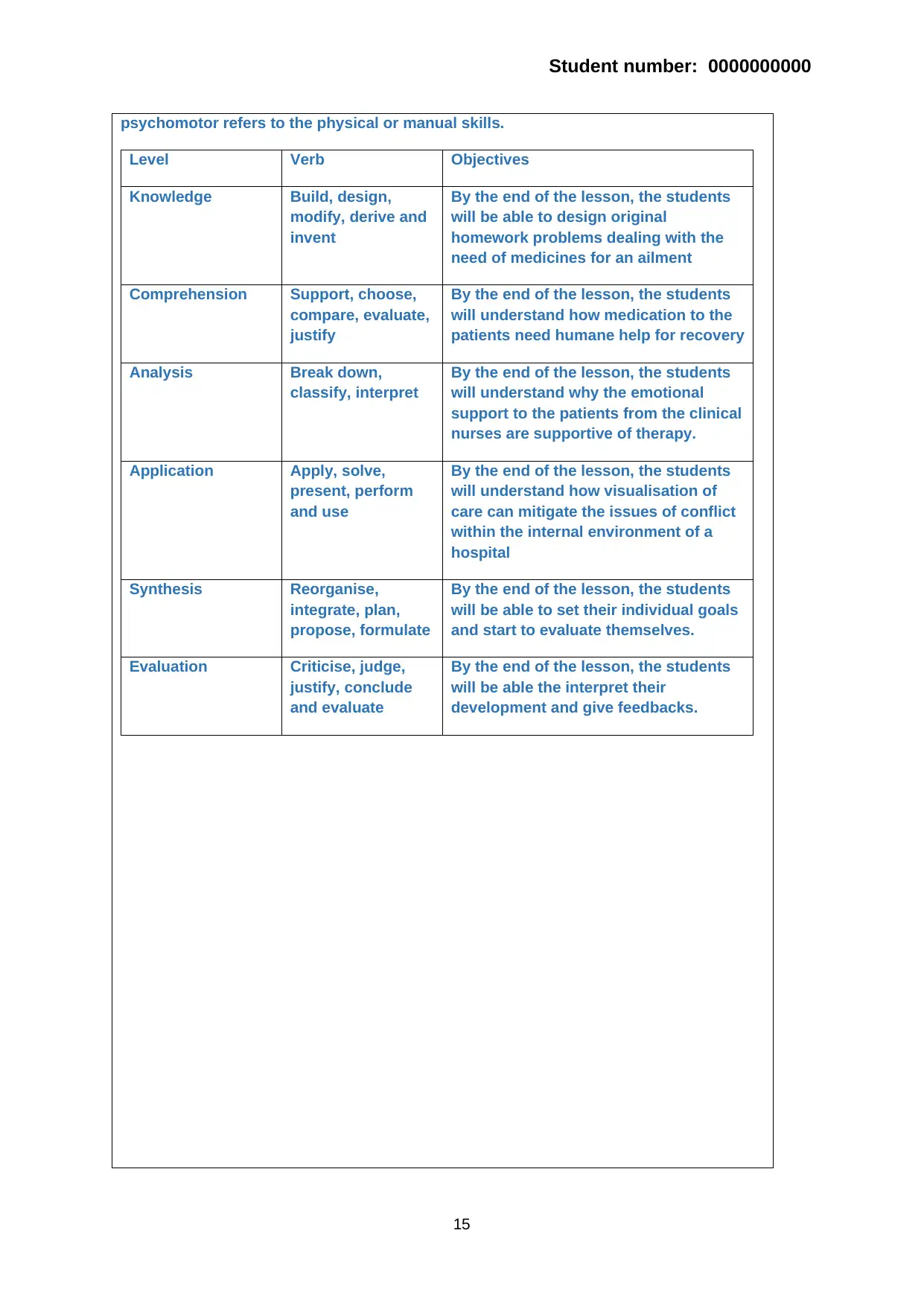
Student number: 0000000000
psychomotor refers to the physical or manual skills.
Level Verb Objectives
Knowledge Build, design,
modify, derive and
invent
By the end of the lesson, the students
will be able to design original
homework problems dealing with the
need of medicines for an ailment
Comprehension Support, choose,
compare, evaluate,
justify
By the end of the lesson, the students
will understand how medication to the
patients need humane help for recovery
Analysis Break down,
classify, interpret
By the end of the lesson, the students
will understand why the emotional
support to the patients from the clinical
nurses are supportive of therapy.
Application Apply, solve,
present, perform
and use
By the end of the lesson, the students
will understand how visualisation of
care can mitigate the issues of conflict
within the internal environment of a
hospital
Synthesis Reorganise,
integrate, plan,
propose, formulate
By the end of the lesson, the students
will be able to set their individual goals
and start to evaluate themselves.
Evaluation Criticise, judge,
justify, conclude
and evaluate
By the end of the lesson, the students
will be able the interpret their
development and give feedbacks.
15
psychomotor refers to the physical or manual skills.
Level Verb Objectives
Knowledge Build, design,
modify, derive and
invent
By the end of the lesson, the students
will be able to design original
homework problems dealing with the
need of medicines for an ailment
Comprehension Support, choose,
compare, evaluate,
justify
By the end of the lesson, the students
will understand how medication to the
patients need humane help for recovery
Analysis Break down,
classify, interpret
By the end of the lesson, the students
will understand why the emotional
support to the patients from the clinical
nurses are supportive of therapy.
Application Apply, solve,
present, perform
and use
By the end of the lesson, the students
will understand how visualisation of
care can mitigate the issues of conflict
within the internal environment of a
hospital
Synthesis Reorganise,
integrate, plan,
propose, formulate
By the end of the lesson, the students
will be able to set their individual goals
and start to evaluate themselves.
Evaluation Criticise, judge,
justify, conclude
and evaluate
By the end of the lesson, the students
will be able the interpret their
development and give feedbacks.
15
Secure Best Marks with AI Grader
Need help grading? Try our AI Grader for instant feedback on your assignments.
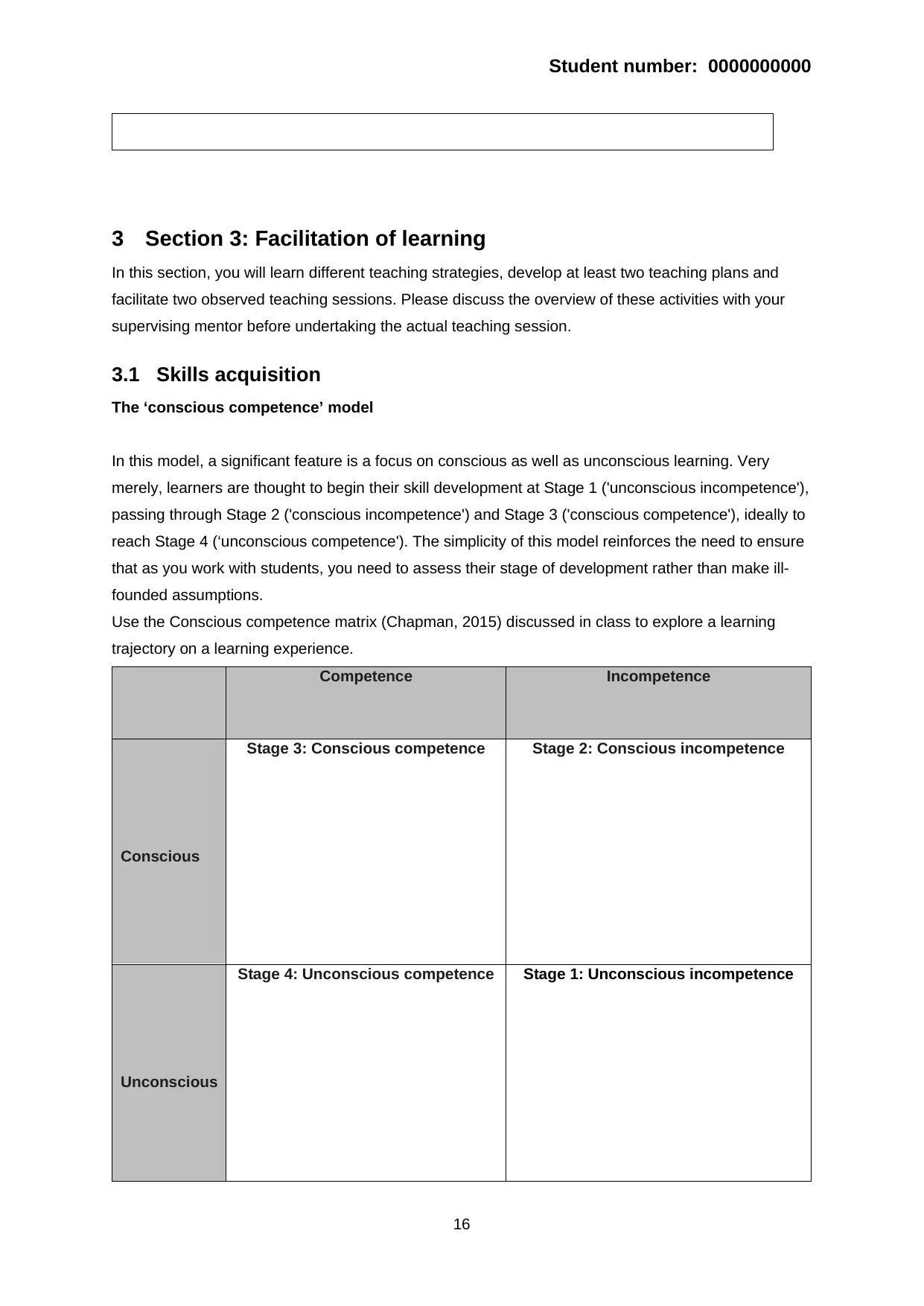
Student number: 0000000000
3 Section 3: Facilitation of learning
In this section, you will learn different teaching strategies, develop at least two teaching plans and
facilitate two observed teaching sessions. Please discuss the overview of these activities with your
supervising mentor before undertaking the actual teaching session.
3.1 Skills acquisition
The ‘conscious competence’ model
In this model, a significant feature is a focus on conscious as well as unconscious learning. Very
merely, learners are thought to begin their skill development at Stage 1 ('unconscious incompetence'),
passing through Stage 2 ('conscious incompetence') and Stage 3 ('conscious competence'), ideally to
reach Stage 4 (‘unconscious competence'). The simplicity of this model reinforces the need to ensure
that as you work with students, you need to assess their stage of development rather than make ill-
founded assumptions.
Use the Conscious competence matrix (Chapman, 2015) discussed in class to explore a learning
trajectory on a learning experience.
Competence Incompetence
Conscious
Stage 3: Conscious competence Stage 2: Conscious incompetence
Unconscious
Stage 4: Unconscious competence Stage 1: Unconscious incompetence
16
3 Section 3: Facilitation of learning
In this section, you will learn different teaching strategies, develop at least two teaching plans and
facilitate two observed teaching sessions. Please discuss the overview of these activities with your
supervising mentor before undertaking the actual teaching session.
3.1 Skills acquisition
The ‘conscious competence’ model
In this model, a significant feature is a focus on conscious as well as unconscious learning. Very
merely, learners are thought to begin their skill development at Stage 1 ('unconscious incompetence'),
passing through Stage 2 ('conscious incompetence') and Stage 3 ('conscious competence'), ideally to
reach Stage 4 (‘unconscious competence'). The simplicity of this model reinforces the need to ensure
that as you work with students, you need to assess their stage of development rather than make ill-
founded assumptions.
Use the Conscious competence matrix (Chapman, 2015) discussed in class to explore a learning
trajectory on a learning experience.
Competence Incompetence
Conscious
Stage 3: Conscious competence Stage 2: Conscious incompetence
Unconscious
Stage 4: Unconscious competence Stage 1: Unconscious incompetence
16
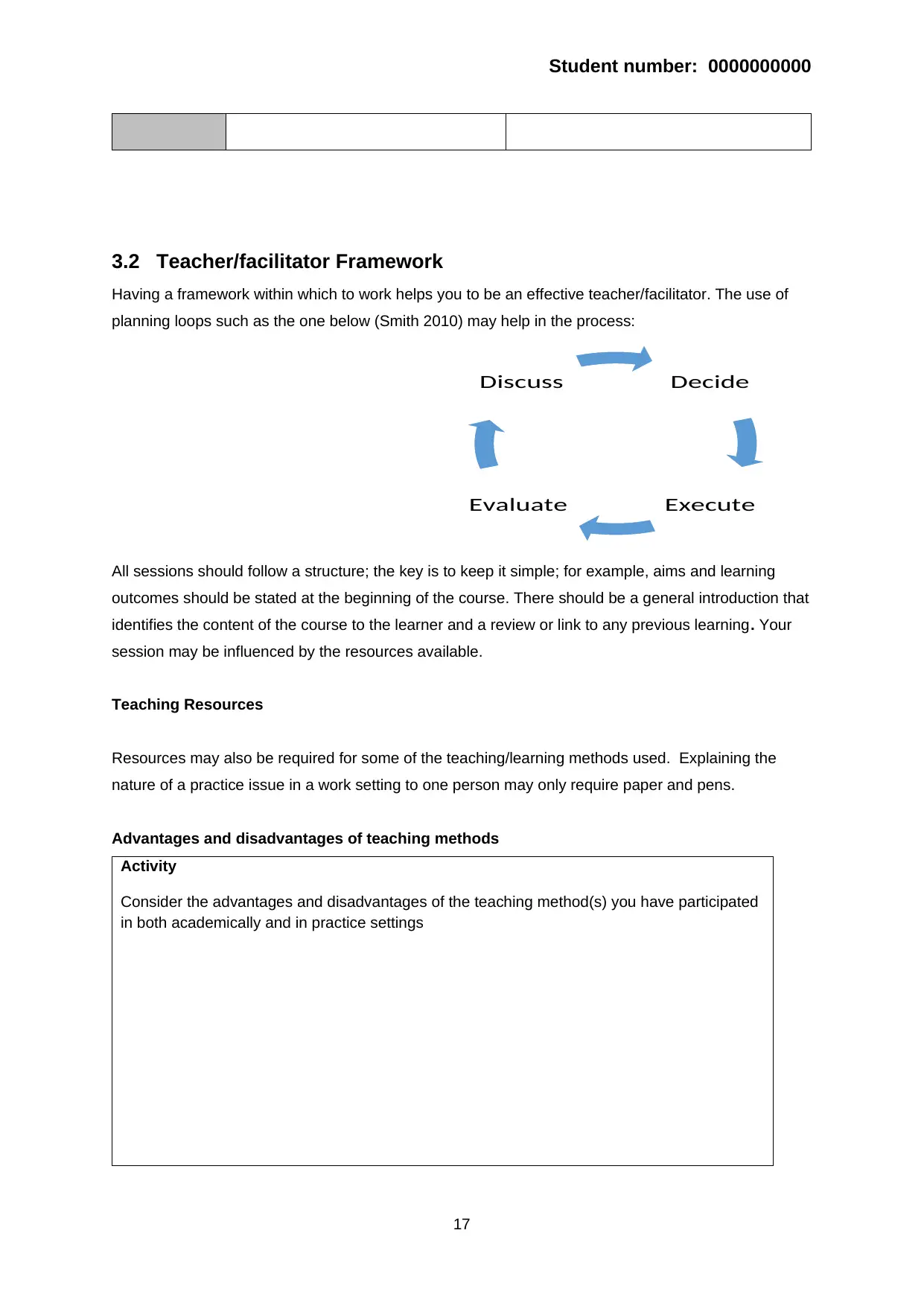
Student number: 0000000000
3.2 Teacher/facilitator Framework
Having a framework within which to work helps you to be an effective teacher/facilitator. The use of
planning loops such as the one below (Smith 2010) may help in the process:
All sessions should follow a structure; the key is to keep it simple; for example, aims and learning
outcomes should be stated at the beginning of the course. There should be a general introduction that
identifies the content of the course to the learner and a review or link to any previous learning. Your
session may be influenced by the resources available.
Teaching Resources
Resources may also be required for some of the teaching/learning methods used. Explaining the
nature of a practice issue in a work setting to one person may only require paper and pens.
Advantages and disadvantages of teaching methods
Activity
Consider the advantages and disadvantages of the teaching method(s) you have participated
in both academically and in practice settings
17
Decide
ExecuteEvaluate
Discuss
3.2 Teacher/facilitator Framework
Having a framework within which to work helps you to be an effective teacher/facilitator. The use of
planning loops such as the one below (Smith 2010) may help in the process:
All sessions should follow a structure; the key is to keep it simple; for example, aims and learning
outcomes should be stated at the beginning of the course. There should be a general introduction that
identifies the content of the course to the learner and a review or link to any previous learning. Your
session may be influenced by the resources available.
Teaching Resources
Resources may also be required for some of the teaching/learning methods used. Explaining the
nature of a practice issue in a work setting to one person may only require paper and pens.
Advantages and disadvantages of teaching methods
Activity
Consider the advantages and disadvantages of the teaching method(s) you have participated
in both academically and in practice settings
17
Decide
ExecuteEvaluate
Discuss
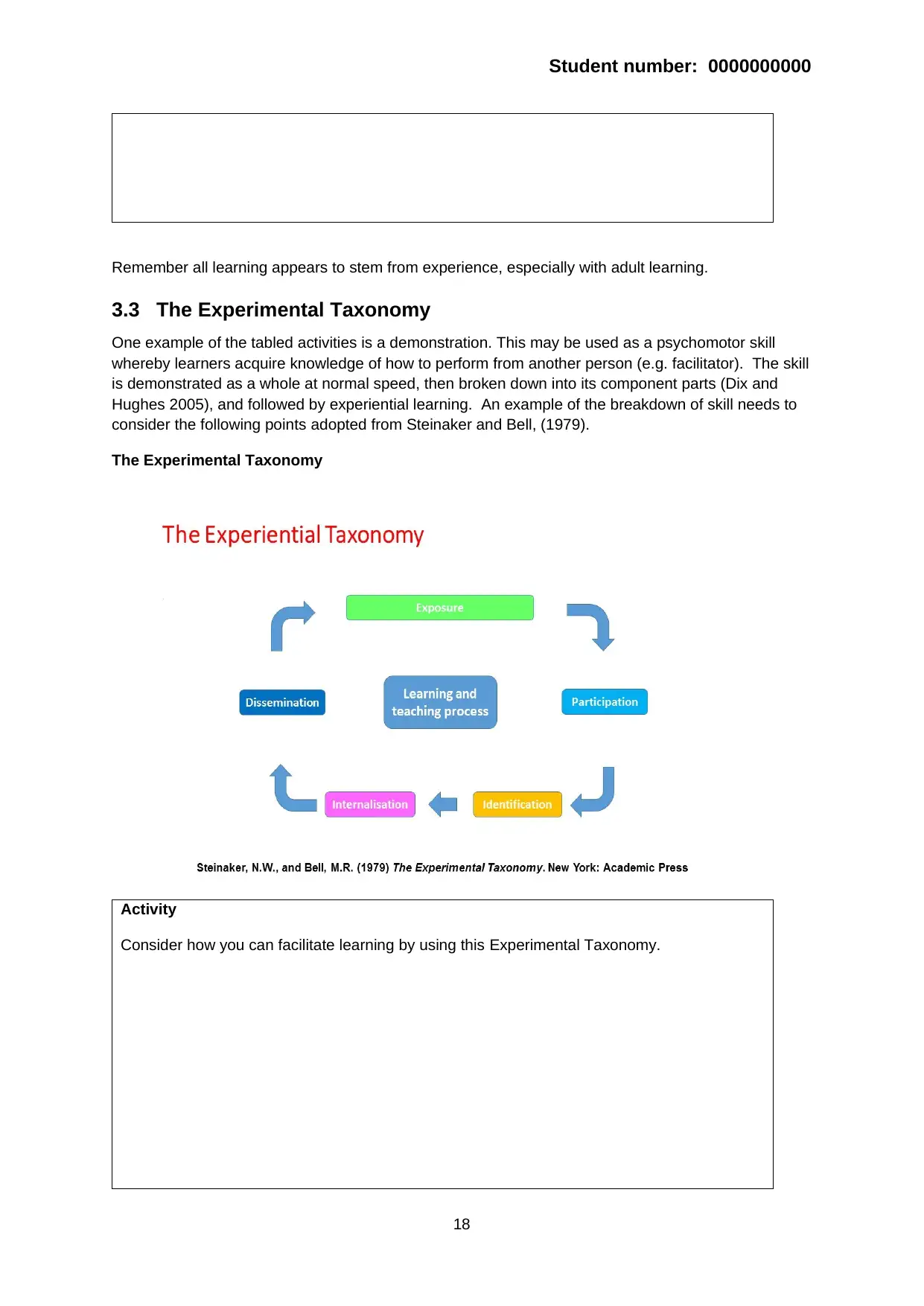
Student number: 0000000000
Remember all learning appears to stem from experience, especially with adult learning.
3.3 The Experimental Taxonomy
One example of the tabled activities is a demonstration. This may be used as a psychomotor skill
whereby learners acquire knowledge of how to perform from another person (e.g. facilitator). The skill
is demonstrated as a whole at normal speed, then broken down into its component parts (Dix and
Hughes 2005), and followed by experiential learning. An example of the breakdown of skill needs to
consider the following points adopted from Steinaker and Bell, (1979).
The Experimental Taxonomy
Activity
Consider how you can facilitate learning by using this Experimental Taxonomy.
18
Remember all learning appears to stem from experience, especially with adult learning.
3.3 The Experimental Taxonomy
One example of the tabled activities is a demonstration. This may be used as a psychomotor skill
whereby learners acquire knowledge of how to perform from another person (e.g. facilitator). The skill
is demonstrated as a whole at normal speed, then broken down into its component parts (Dix and
Hughes 2005), and followed by experiential learning. An example of the breakdown of skill needs to
consider the following points adopted from Steinaker and Bell, (1979).
The Experimental Taxonomy
Activity
Consider how you can facilitate learning by using this Experimental Taxonomy.
18
Paraphrase This Document
Need a fresh take? Get an instant paraphrase of this document with our AI Paraphraser
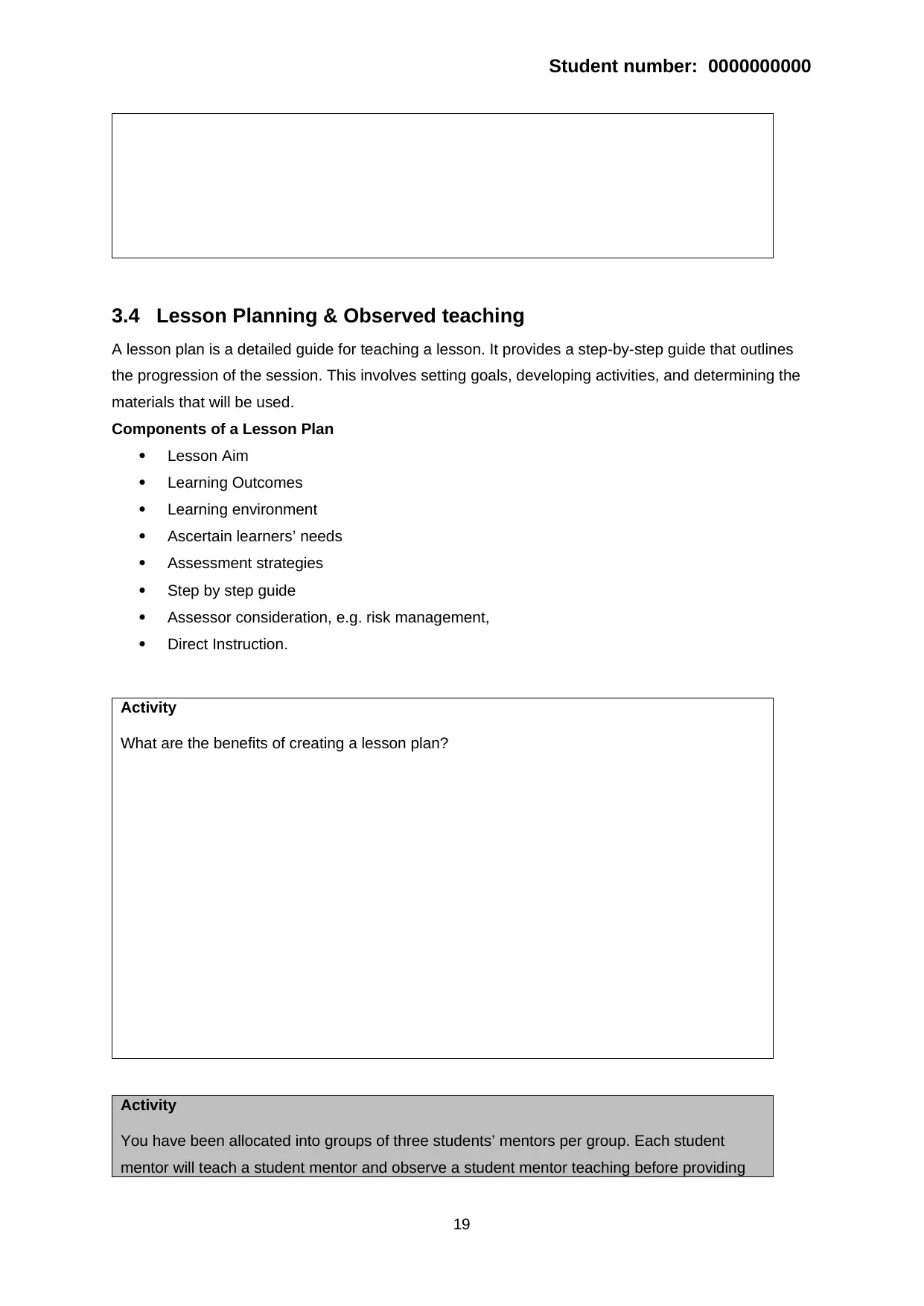
Student number: 0000000000
3.4 Lesson Planning & Observed teaching
A lesson plan is a detailed guide for teaching a lesson. It provides a step-by-step guide that outlines
the progression of the session. This involves setting goals, developing activities, and determining the
materials that will be used.
Components of a Lesson Plan
Lesson Aim
Learning Outcomes
Learning environment
Ascertain learners’ needs
Assessment strategies
Step by step guide
Assessor consideration, e.g. risk management,
Direct Instruction.
Activity
What are the benefits of creating a lesson plan?
Activity
You have been allocated into groups of three students’ mentors per group. Each student
mentor will teach a student mentor and observe a student mentor teaching before providing
19
3.4 Lesson Planning & Observed teaching
A lesson plan is a detailed guide for teaching a lesson. It provides a step-by-step guide that outlines
the progression of the session. This involves setting goals, developing activities, and determining the
materials that will be used.
Components of a Lesson Plan
Lesson Aim
Learning Outcomes
Learning environment
Ascertain learners’ needs
Assessment strategies
Step by step guide
Assessor consideration, e.g. risk management,
Direct Instruction.
Activity
What are the benefits of creating a lesson plan?
Activity
You have been allocated into groups of three students’ mentors per group. Each student
mentor will teach a student mentor and observe a student mentor teaching before providing
19
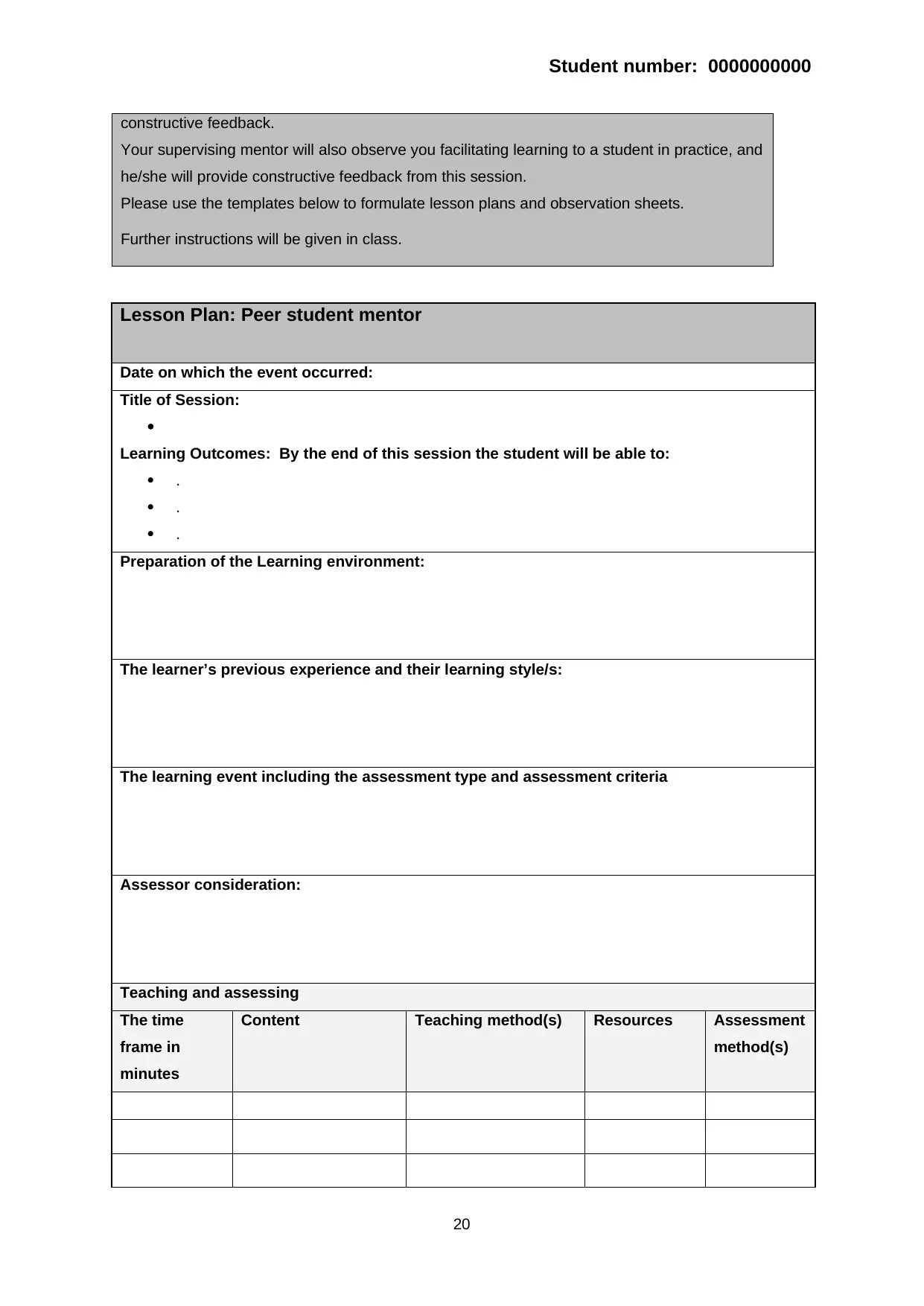
Student number: 0000000000
constructive feedback.
Your supervising mentor will also observe you facilitating learning to a student in practice, and
he/she will provide constructive feedback from this session.
Please use the templates below to formulate lesson plans and observation sheets.
Further instructions will be given in class.
Lesson Plan: Peer student mentor
Date on which the event occurred:
Title of Session:
Learning Outcomes: By the end of this session the student will be able to:
.
.
.
Preparation of the Learning environment:
The learner’s previous experience and their learning style/s:
The learning event including the assessment type and assessment criteria
Assessor consideration:
Teaching and assessing
The time
frame in
minutes
Content Teaching method(s) Resources Assessment
method(s)
20
constructive feedback.
Your supervising mentor will also observe you facilitating learning to a student in practice, and
he/she will provide constructive feedback from this session.
Please use the templates below to formulate lesson plans and observation sheets.
Further instructions will be given in class.
Lesson Plan: Peer student mentor
Date on which the event occurred:
Title of Session:
Learning Outcomes: By the end of this session the student will be able to:
.
.
.
Preparation of the Learning environment:
The learner’s previous experience and their learning style/s:
The learning event including the assessment type and assessment criteria
Assessor consideration:
Teaching and assessing
The time
frame in
minutes
Content Teaching method(s) Resources Assessment
method(s)
20
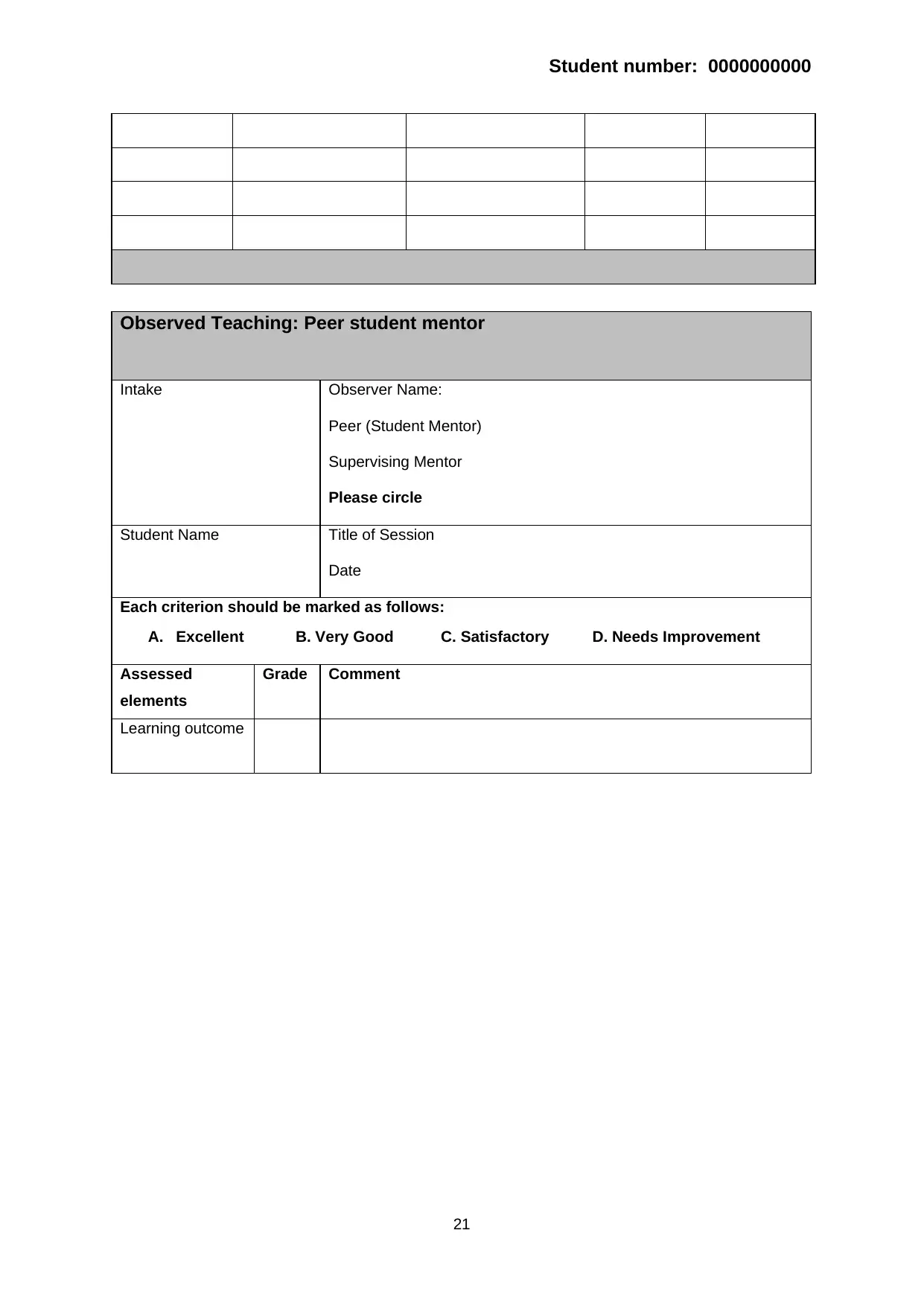
Student number: 0000000000
Observed Teaching: Peer student mentor
Intake Observer Name:
Peer (Student Mentor)
Supervising Mentor
Please circle
Student Name Title of Session
Date
Each criterion should be marked as follows:
A. Excellent B. Very Good C. Satisfactory D. Needs Improvement
Assessed
elements
Grade Comment
Learning outcome
21
Observed Teaching: Peer student mentor
Intake Observer Name:
Peer (Student Mentor)
Supervising Mentor
Please circle
Student Name Title of Session
Date
Each criterion should be marked as follows:
A. Excellent B. Very Good C. Satisfactory D. Needs Improvement
Assessed
elements
Grade Comment
Learning outcome
21
Secure Best Marks with AI Grader
Need help grading? Try our AI Grader for instant feedback on your assignments.
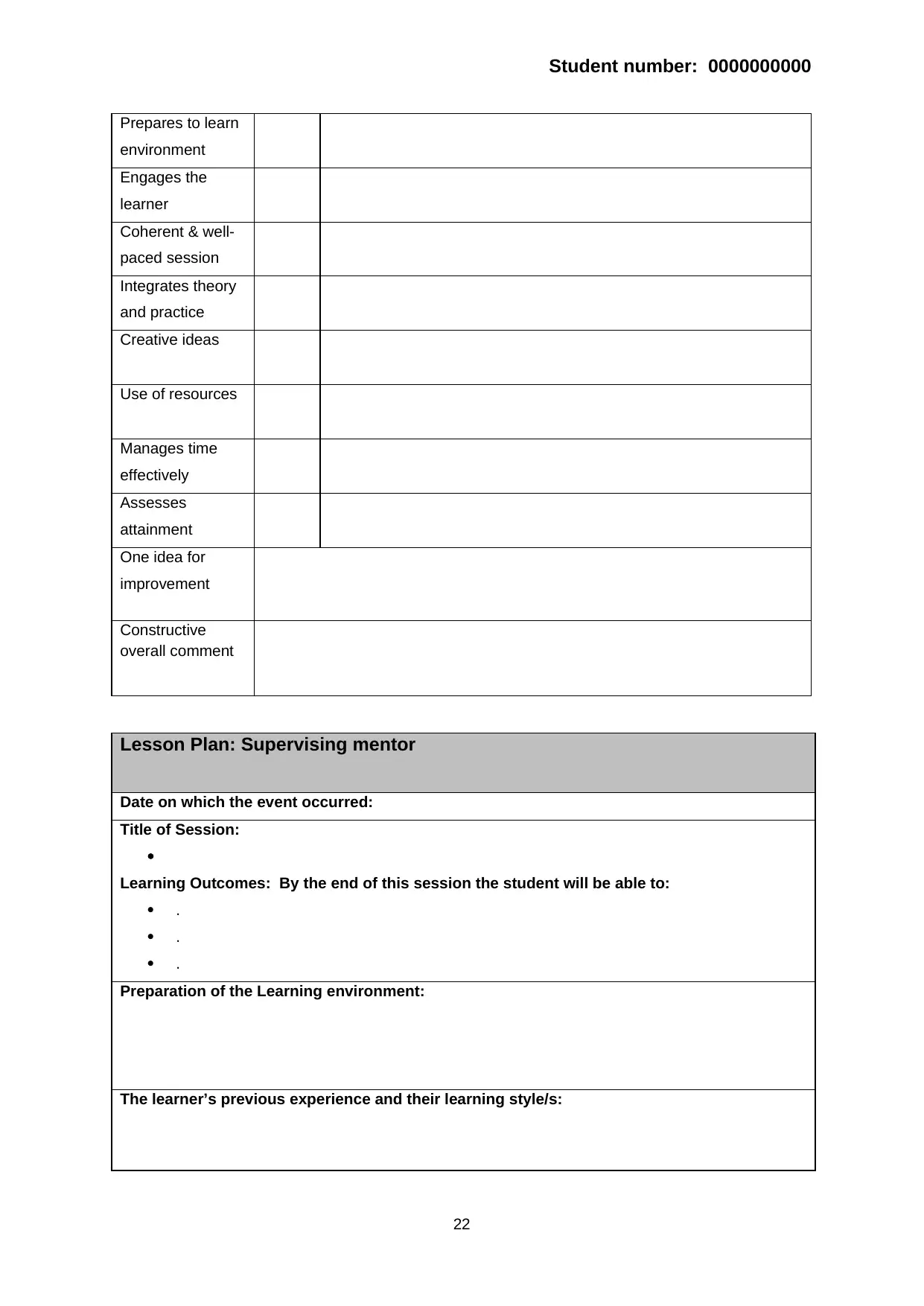
Student number: 0000000000
Prepares to learn
environment
Engages the
learner
Coherent & well-
paced session
Integrates theory
and practice
Creative ideas
Use of resources
Manages time
effectively
Assesses
attainment
One idea for
improvement
Constructive
overall comment
Lesson Plan: Supervising mentor
Date on which the event occurred:
Title of Session:
Learning Outcomes: By the end of this session the student will be able to:
.
.
.
Preparation of the Learning environment:
The learner’s previous experience and their learning style/s:
22
Prepares to learn
environment
Engages the
learner
Coherent & well-
paced session
Integrates theory
and practice
Creative ideas
Use of resources
Manages time
effectively
Assesses
attainment
One idea for
improvement
Constructive
overall comment
Lesson Plan: Supervising mentor
Date on which the event occurred:
Title of Session:
Learning Outcomes: By the end of this session the student will be able to:
.
.
.
Preparation of the Learning environment:
The learner’s previous experience and their learning style/s:
22
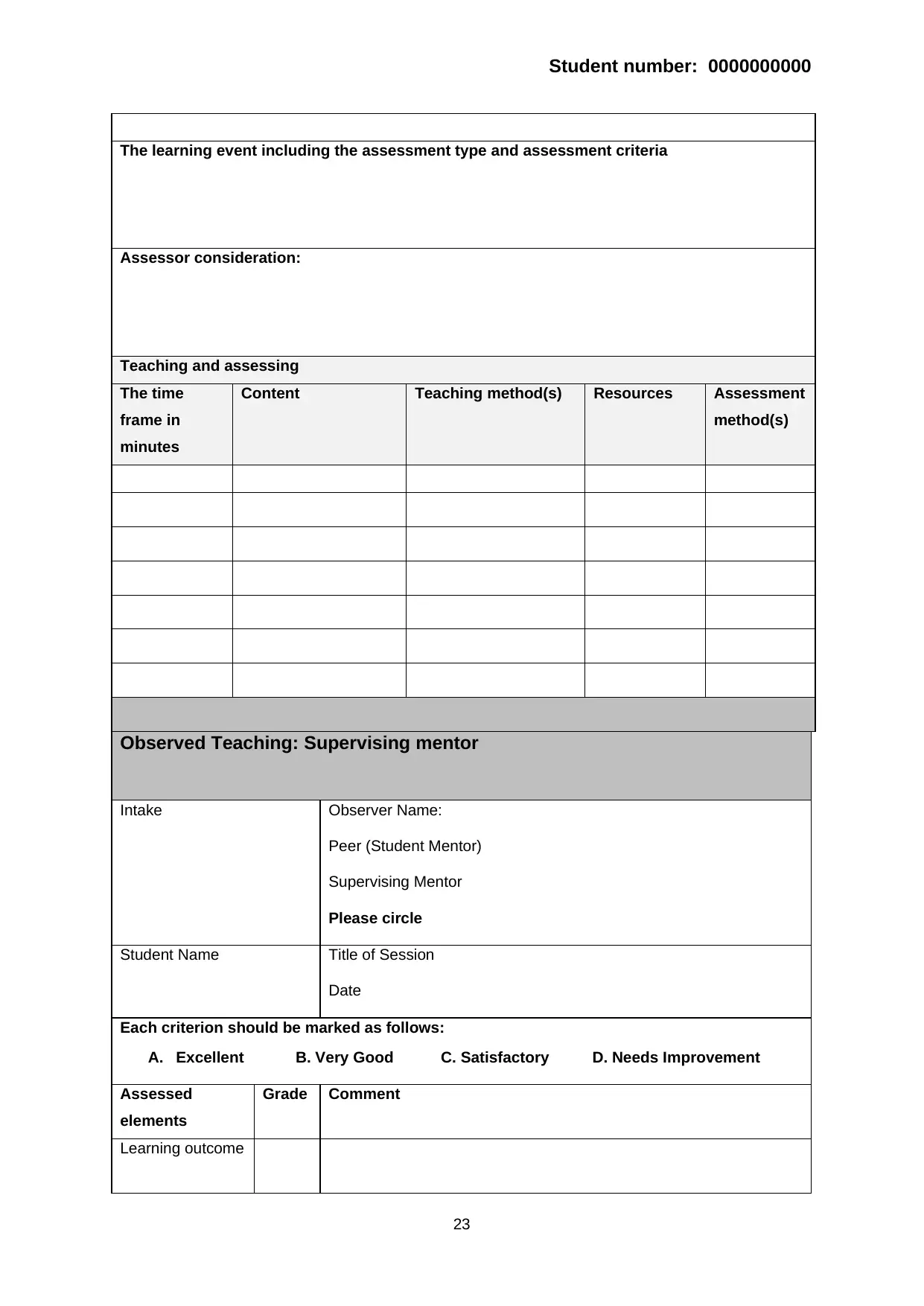
Student number: 0000000000
The learning event including the assessment type and assessment criteria
Assessor consideration:
Teaching and assessing
The time
frame in
minutes
Content Teaching method(s) Resources Assessment
method(s)
Observed Teaching: Supervising mentor
Intake Observer Name:
Peer (Student Mentor)
Supervising Mentor
Please circle
Student Name Title of Session
Date
Each criterion should be marked as follows:
A. Excellent B. Very Good C. Satisfactory D. Needs Improvement
Assessed
elements
Grade Comment
Learning outcome
23
The learning event including the assessment type and assessment criteria
Assessor consideration:
Teaching and assessing
The time
frame in
minutes
Content Teaching method(s) Resources Assessment
method(s)
Observed Teaching: Supervising mentor
Intake Observer Name:
Peer (Student Mentor)
Supervising Mentor
Please circle
Student Name Title of Session
Date
Each criterion should be marked as follows:
A. Excellent B. Very Good C. Satisfactory D. Needs Improvement
Assessed
elements
Grade Comment
Learning outcome
23
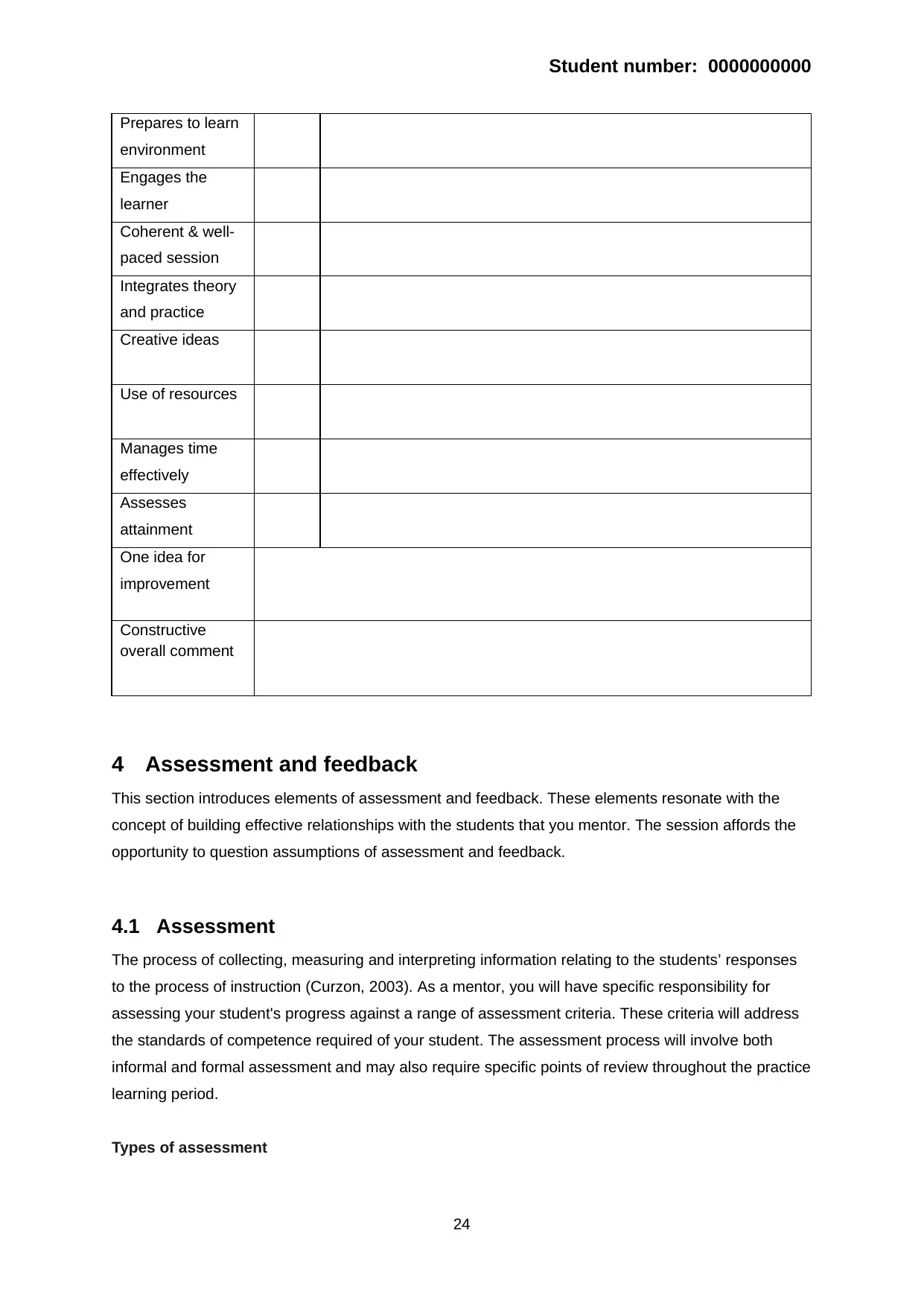
Student number: 0000000000
Prepares to learn
environment
Engages the
learner
Coherent & well-
paced session
Integrates theory
and practice
Creative ideas
Use of resources
Manages time
effectively
Assesses
attainment
One idea for
improvement
Constructive
overall comment
4 Assessment and feedback
This section introduces elements of assessment and feedback. These elements resonate with the
concept of building effective relationships with the students that you mentor. The session affords the
opportunity to question assumptions of assessment and feedback.
4.1 Assessment
The process of collecting, measuring and interpreting information relating to the students’ responses
to the process of instruction (Curzon, 2003). As a mentor, you will have specific responsibility for
assessing your student's progress against a range of assessment criteria. These criteria will address
the standards of competence required of your student. The assessment process will involve both
informal and formal assessment and may also require specific points of review throughout the practice
learning period.
Types of assessment
24
Prepares to learn
environment
Engages the
learner
Coherent & well-
paced session
Integrates theory
and practice
Creative ideas
Use of resources
Manages time
effectively
Assesses
attainment
One idea for
improvement
Constructive
overall comment
4 Assessment and feedback
This section introduces elements of assessment and feedback. These elements resonate with the
concept of building effective relationships with the students that you mentor. The session affords the
opportunity to question assumptions of assessment and feedback.
4.1 Assessment
The process of collecting, measuring and interpreting information relating to the students’ responses
to the process of instruction (Curzon, 2003). As a mentor, you will have specific responsibility for
assessing your student's progress against a range of assessment criteria. These criteria will address
the standards of competence required of your student. The assessment process will involve both
informal and formal assessment and may also require specific points of review throughout the practice
learning period.
Types of assessment
24
Paraphrase This Document
Need a fresh take? Get an instant paraphrase of this document with our AI Paraphraser
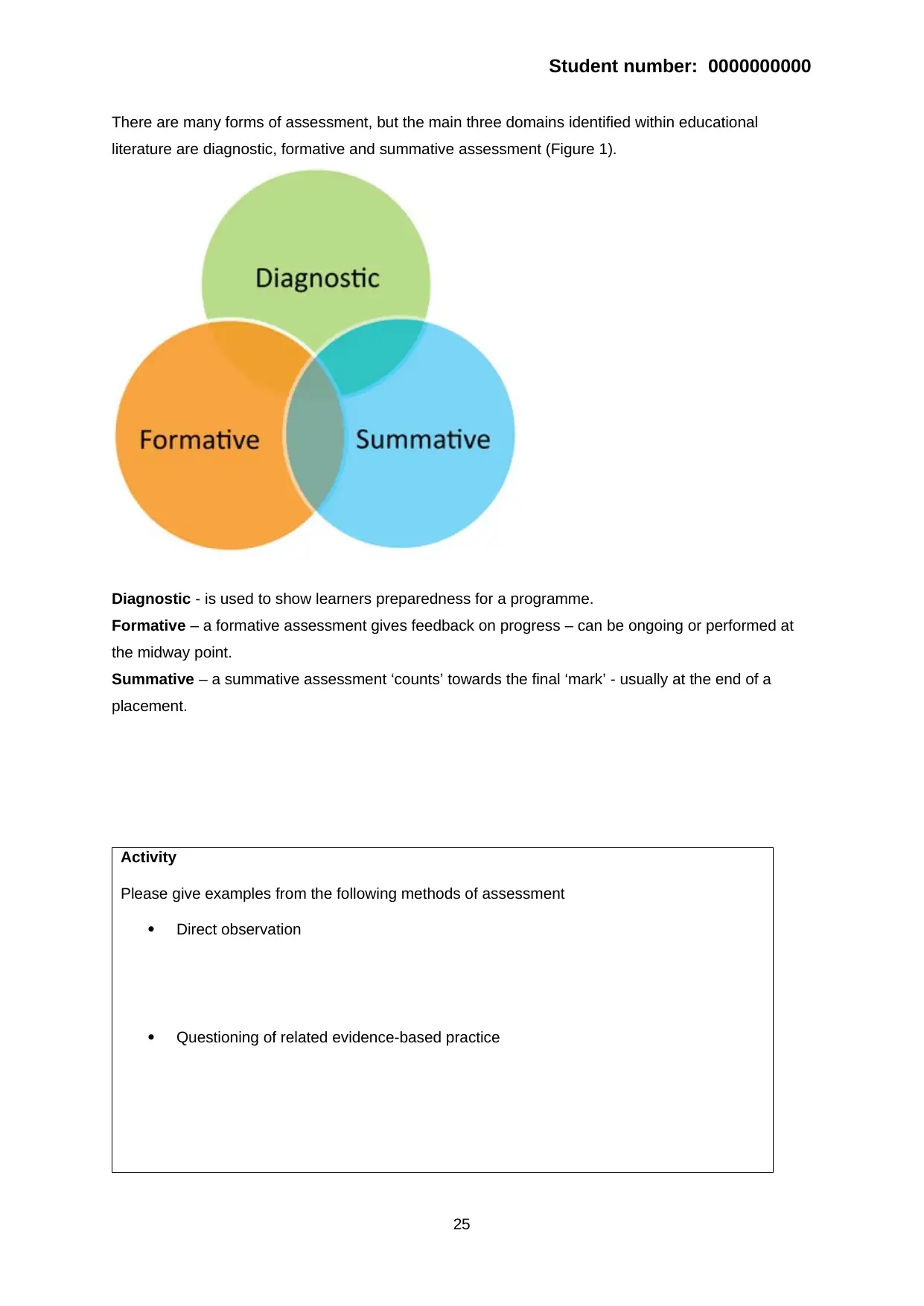
Student number: 0000000000
There are many forms of assessment, but the main three domains identified within educational
literature are diagnostic, formative and summative assessment (Figure 1).
Diagnostic - is used to show learners preparedness for a programme.
Formative – a formative assessment gives feedback on progress – can be ongoing or performed at
the midway point.
Summative – a summative assessment ‘counts’ towards the final ‘mark’ - usually at the end of a
placement.
Activity
Please give examples from the following methods of assessment
Direct observation
Questioning of related evidence-based practice
25
There are many forms of assessment, but the main three domains identified within educational
literature are diagnostic, formative and summative assessment (Figure 1).
Diagnostic - is used to show learners preparedness for a programme.
Formative – a formative assessment gives feedback on progress – can be ongoing or performed at
the midway point.
Summative – a summative assessment ‘counts’ towards the final ‘mark’ - usually at the end of a
placement.
Activity
Please give examples from the following methods of assessment
Direct observation
Questioning of related evidence-based practice
25
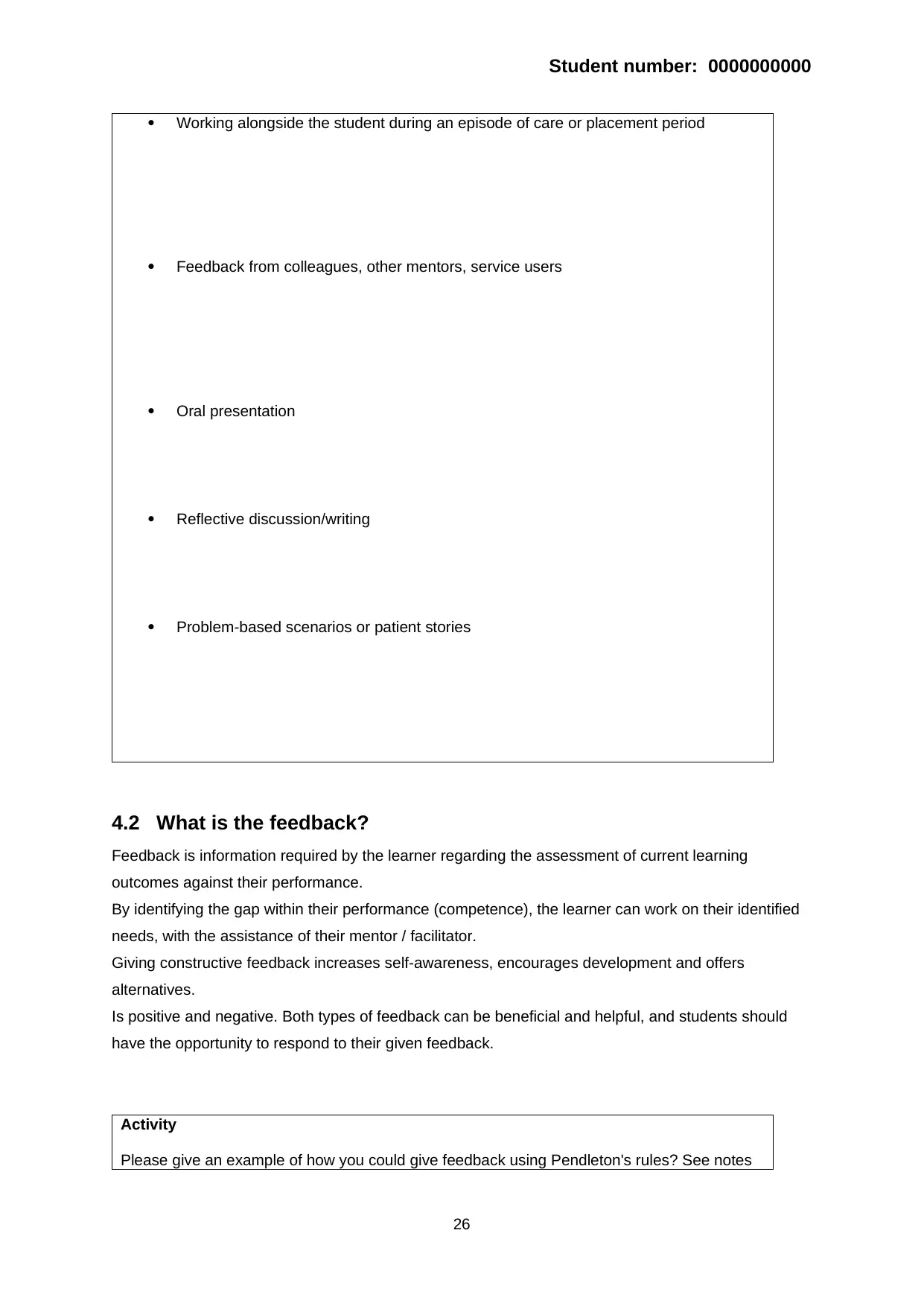
Student number: 0000000000
Working alongside the student during an episode of care or placement period
Feedback from colleagues, other mentors, service users
Oral presentation
Reflective discussion/writing
Problem-based scenarios or patient stories
4.2 What is the feedback?
Feedback is information required by the learner regarding the assessment of current learning
outcomes against their performance.
By identifying the gap within their performance (competence), the learner can work on their identified
needs, with the assistance of their mentor / facilitator.
Giving constructive feedback increases self-awareness, encourages development and offers
alternatives.
Is positive and negative. Both types of feedback can be beneficial and helpful, and students should
have the opportunity to respond to their given feedback.
Activity
Please give an example of how you could give feedback using Pendleton's rules? See notes
26
Working alongside the student during an episode of care or placement period
Feedback from colleagues, other mentors, service users
Oral presentation
Reflective discussion/writing
Problem-based scenarios or patient stories
4.2 What is the feedback?
Feedback is information required by the learner regarding the assessment of current learning
outcomes against their performance.
By identifying the gap within their performance (competence), the learner can work on their identified
needs, with the assistance of their mentor / facilitator.
Giving constructive feedback increases self-awareness, encourages development and offers
alternatives.
Is positive and negative. Both types of feedback can be beneficial and helpful, and students should
have the opportunity to respond to their given feedback.
Activity
Please give an example of how you could give feedback using Pendleton's rules? See notes
26
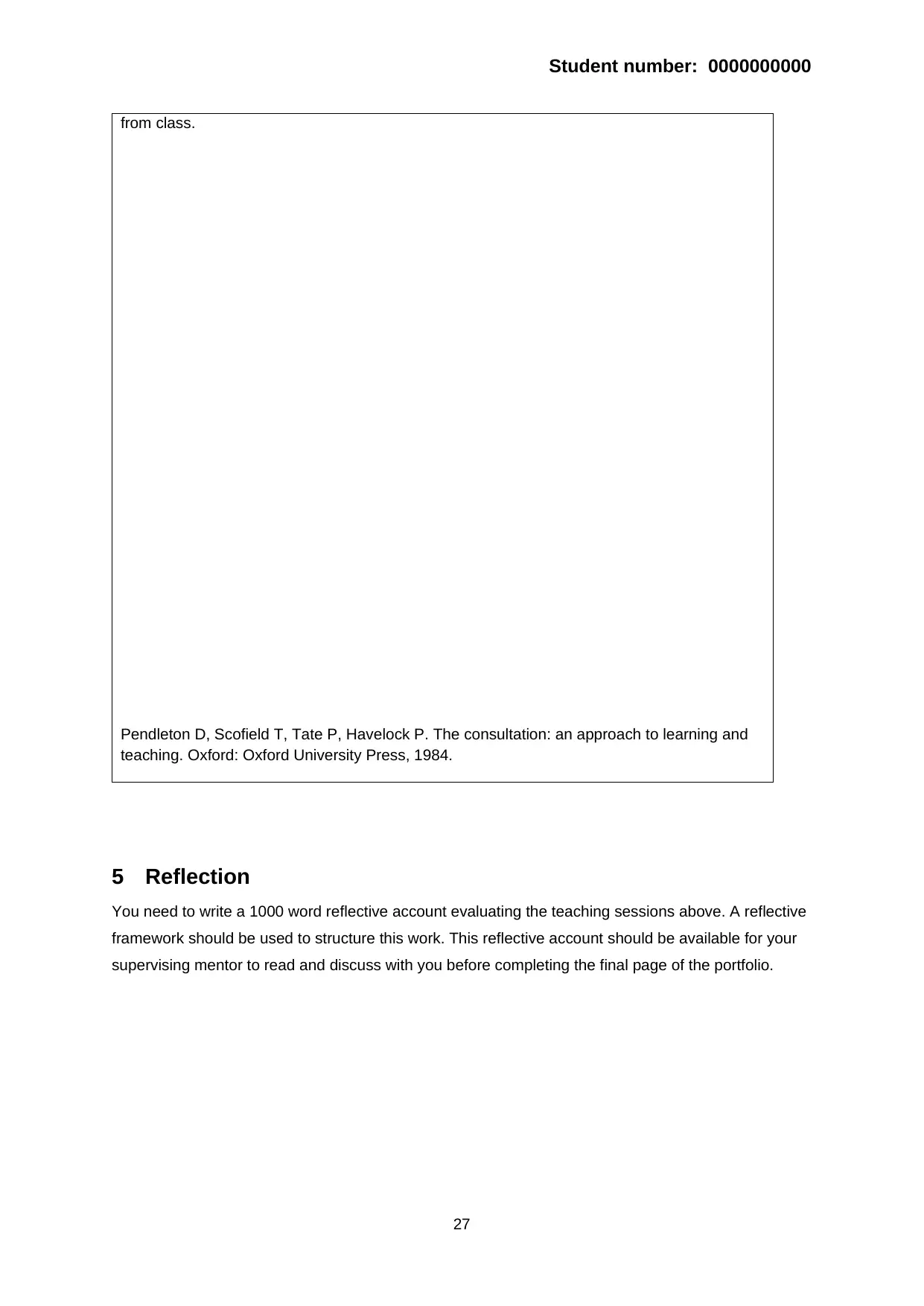
Student number: 0000000000
from class.
Pendleton D, Scofield T, Tate P, Havelock P. The consultation: an approach to learning and
teaching. Oxford: Oxford University Press, 1984.
5 Reflection
You need to write a 1000 word reflective account evaluating the teaching sessions above. A reflective
framework should be used to structure this work. This reflective account should be available for your
supervising mentor to read and discuss with you before completing the final page of the portfolio.
27
from class.
Pendleton D, Scofield T, Tate P, Havelock P. The consultation: an approach to learning and
teaching. Oxford: Oxford University Press, 1984.
5 Reflection
You need to write a 1000 word reflective account evaluating the teaching sessions above. A reflective
framework should be used to structure this work. This reflective account should be available for your
supervising mentor to read and discuss with you before completing the final page of the portfolio.
27
Secure Best Marks with AI Grader
Need help grading? Try our AI Grader for instant feedback on your assignments.
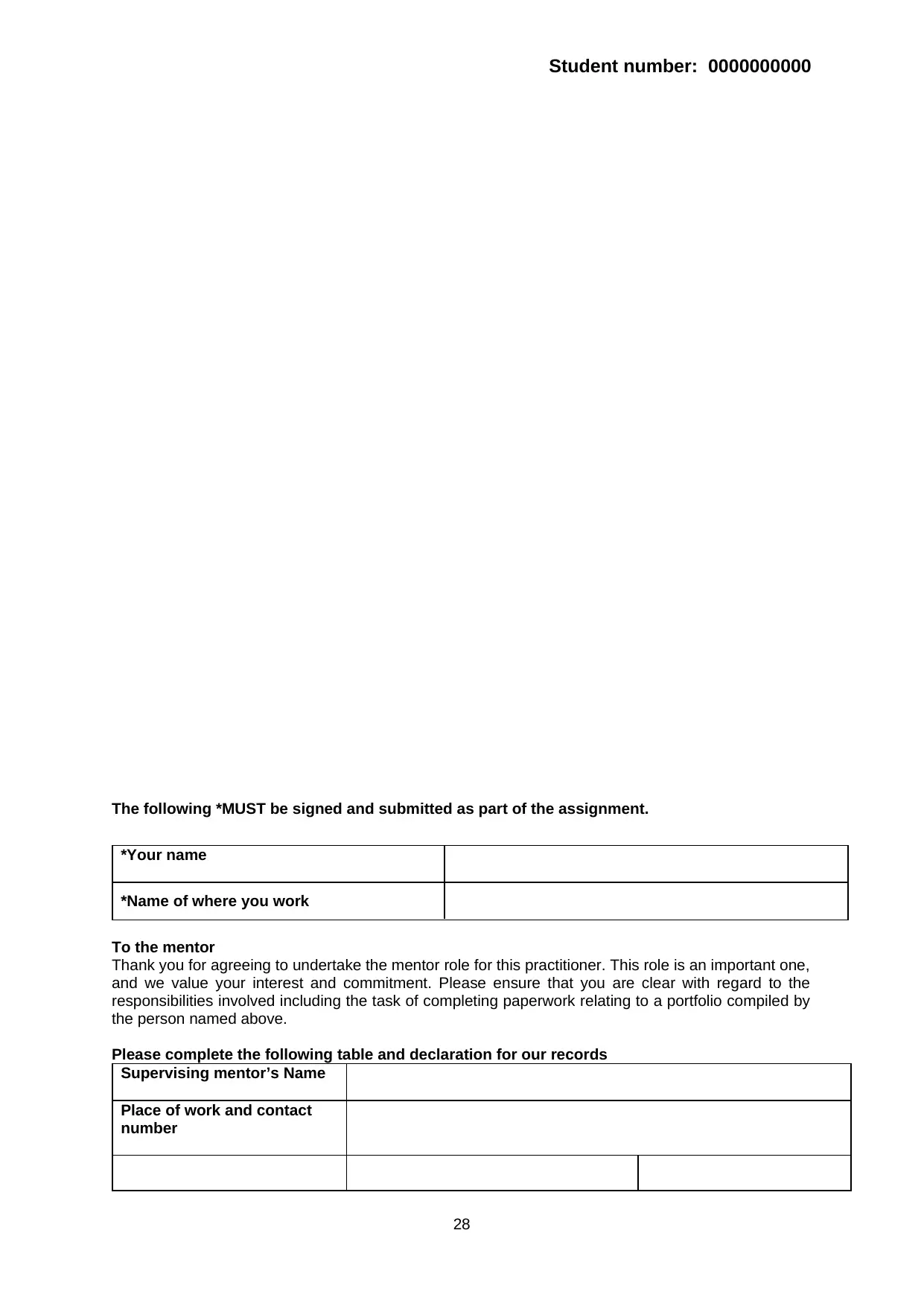
Student number: 0000000000
The following *MUST be signed and submitted as part of the assignment.
*Your name
*Name of where you work
To the mentor
Thank you for agreeing to undertake the mentor role for this practitioner. This role is an important one,
and we value your interest and commitment. Please ensure that you are clear with regard to the
responsibilities involved including the task of completing paperwork relating to a portfolio compiled by
the person named above.
Please complete the following table and declaration for our records
Supervising mentor’s Name
Place of work and contact
number
28
The following *MUST be signed and submitted as part of the assignment.
*Your name
*Name of where you work
To the mentor
Thank you for agreeing to undertake the mentor role for this practitioner. This role is an important one,
and we value your interest and commitment. Please ensure that you are clear with regard to the
responsibilities involved including the task of completing paperwork relating to a portfolio compiled by
the person named above.
Please complete the following table and declaration for our records
Supervising mentor’s Name
Place of work and contact
number
28
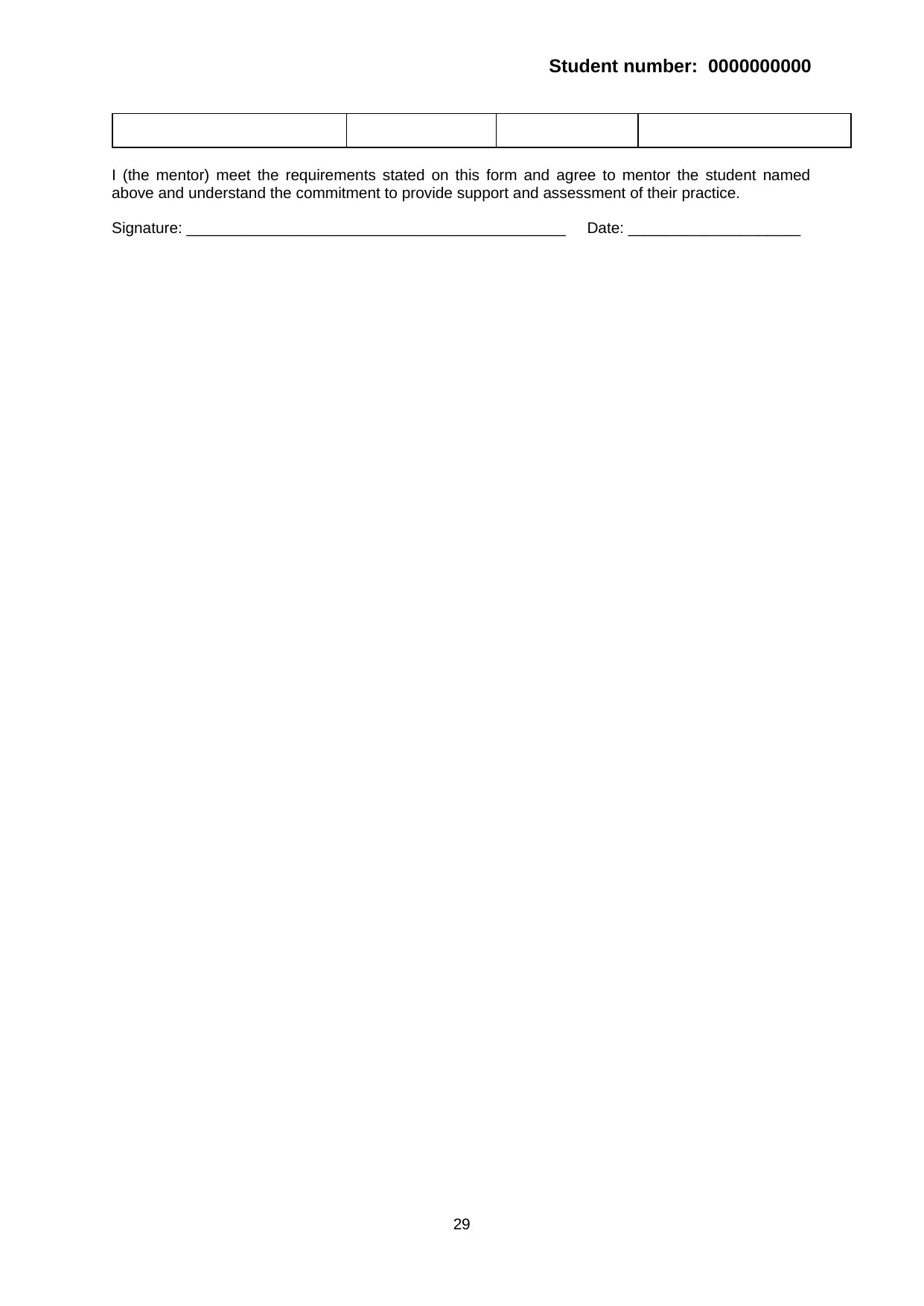
Student number: 0000000000
I (the mentor) meet the requirements stated on this form and agree to mentor the student named
above and understand the commitment to provide support and assessment of their practice.
Signature: ____________________________________________ Date: ____________________
29
I (the mentor) meet the requirements stated on this form and agree to mentor the student named
above and understand the commitment to provide support and assessment of their practice.
Signature: ____________________________________________ Date: ____________________
29
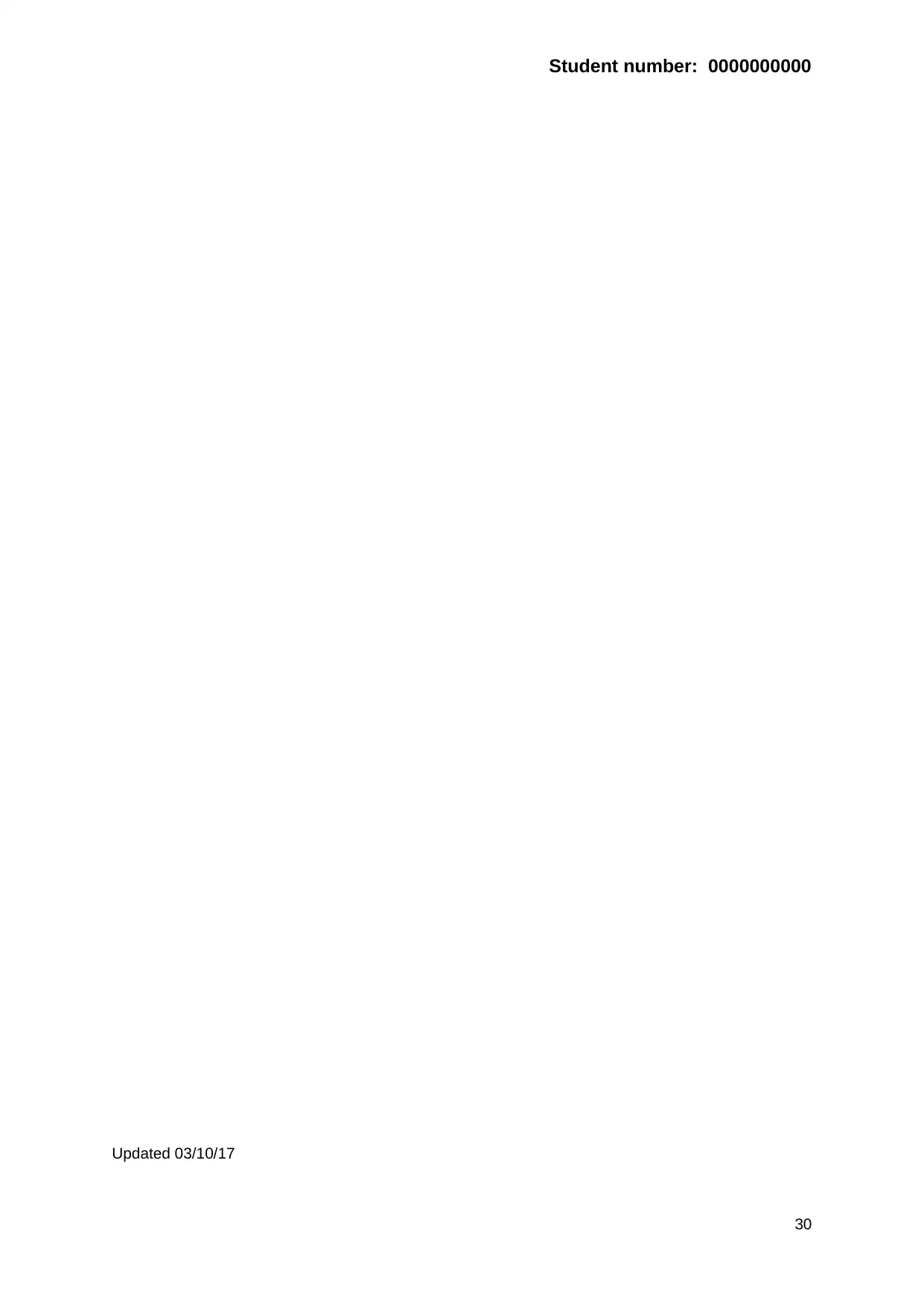
Student number: 0000000000
Updated 03/10/17
30
Updated 03/10/17
30
1 out of 31
Related Documents
Your All-in-One AI-Powered Toolkit for Academic Success.
+13062052269
info@desklib.com
Available 24*7 on WhatsApp / Email
![[object Object]](/_next/static/media/star-bottom.7253800d.svg)
Unlock your academic potential
© 2024 | Zucol Services PVT LTD | All rights reserved.





